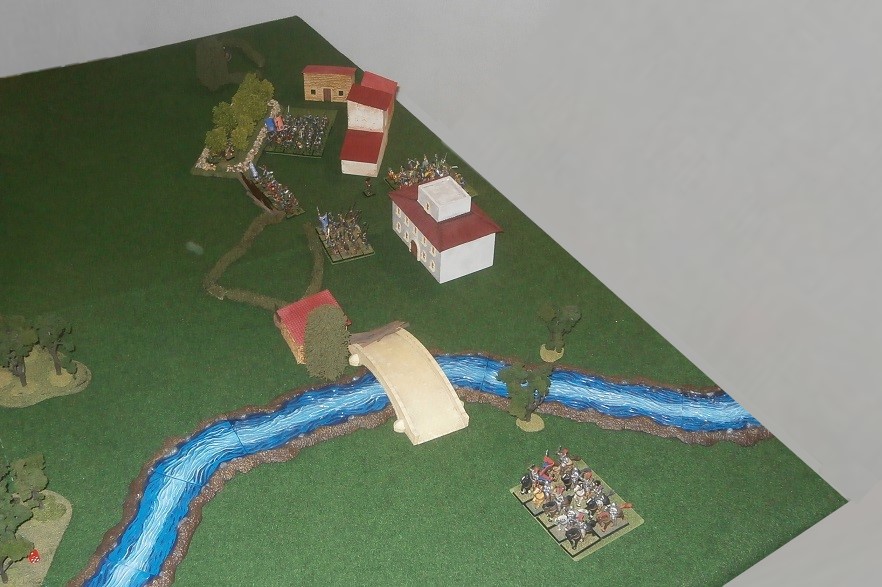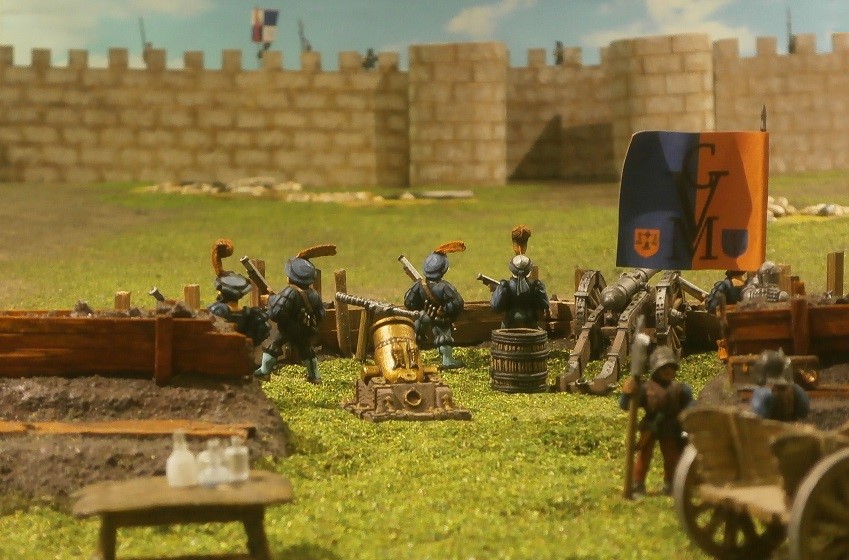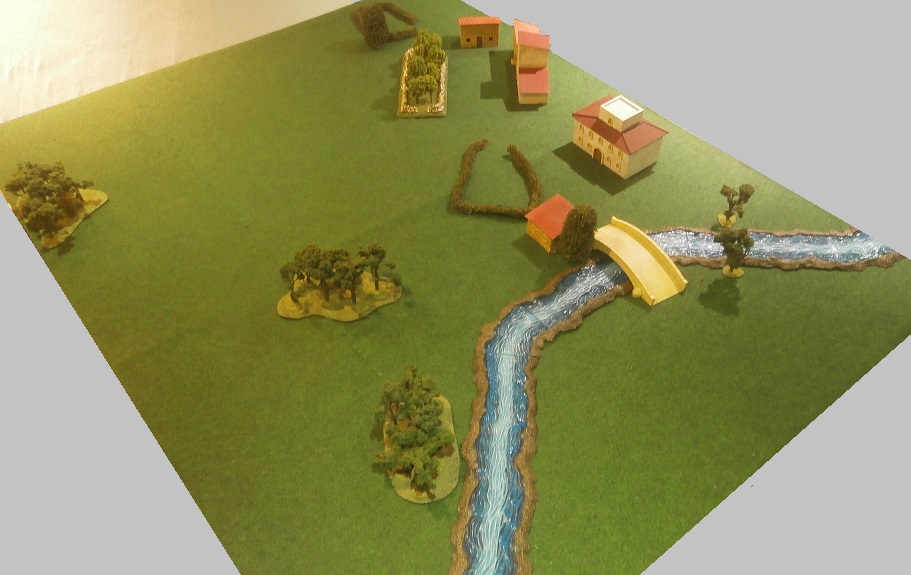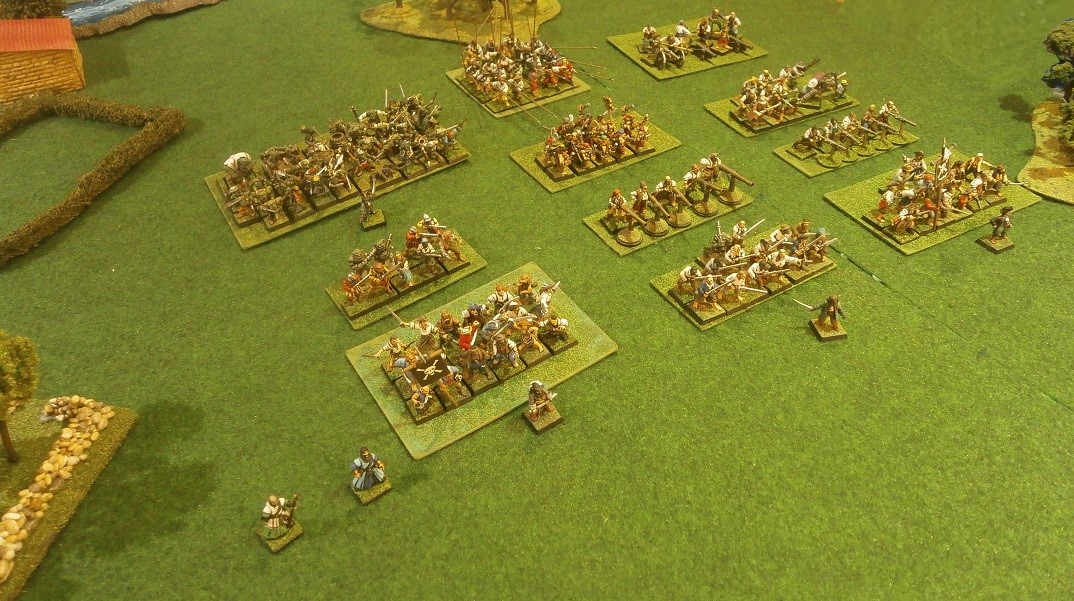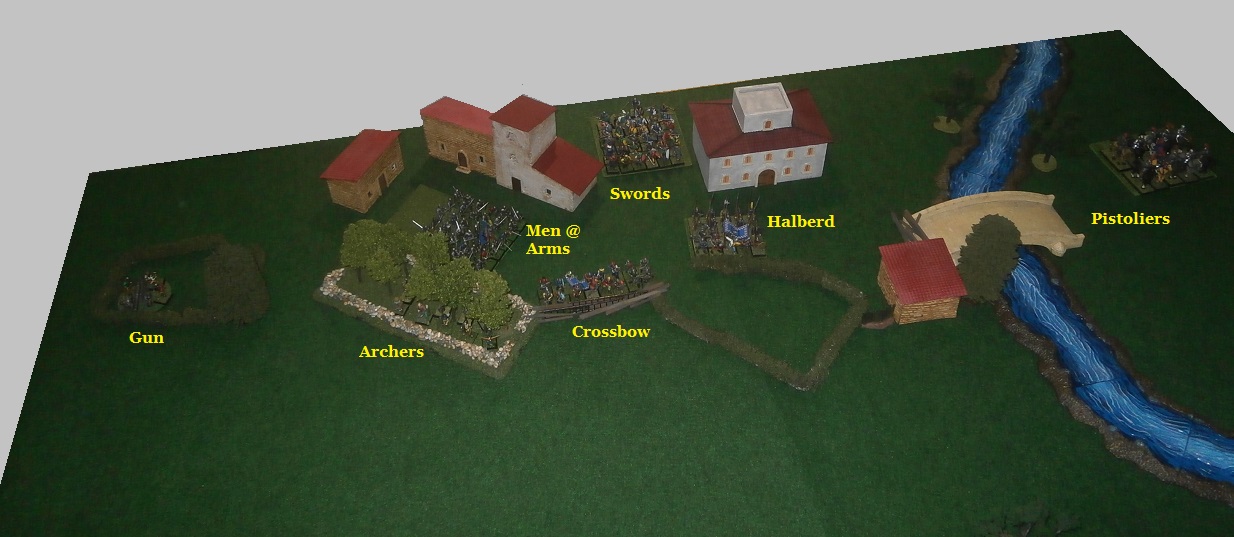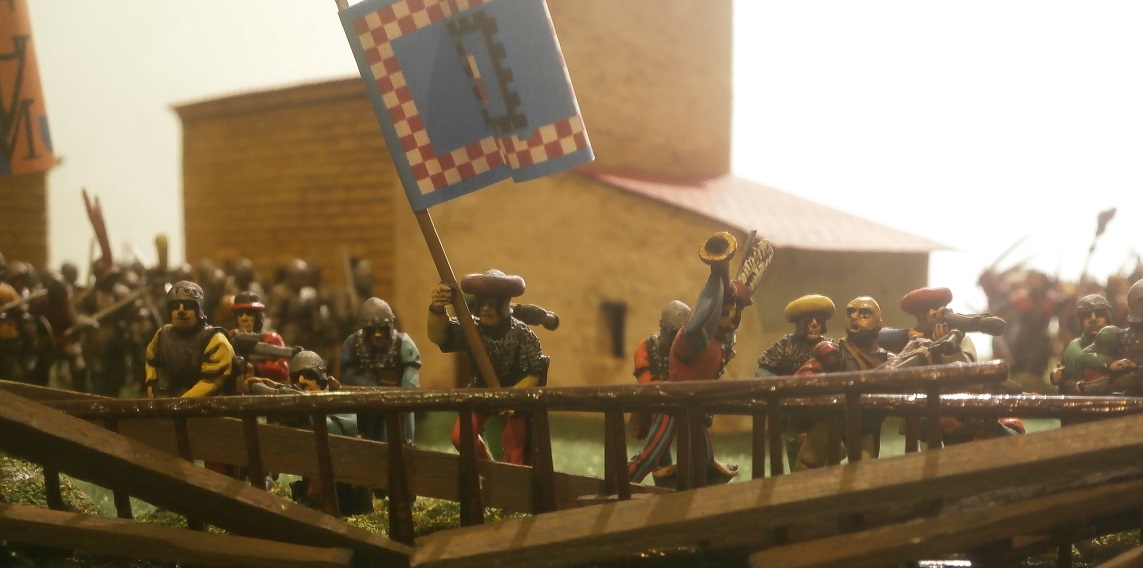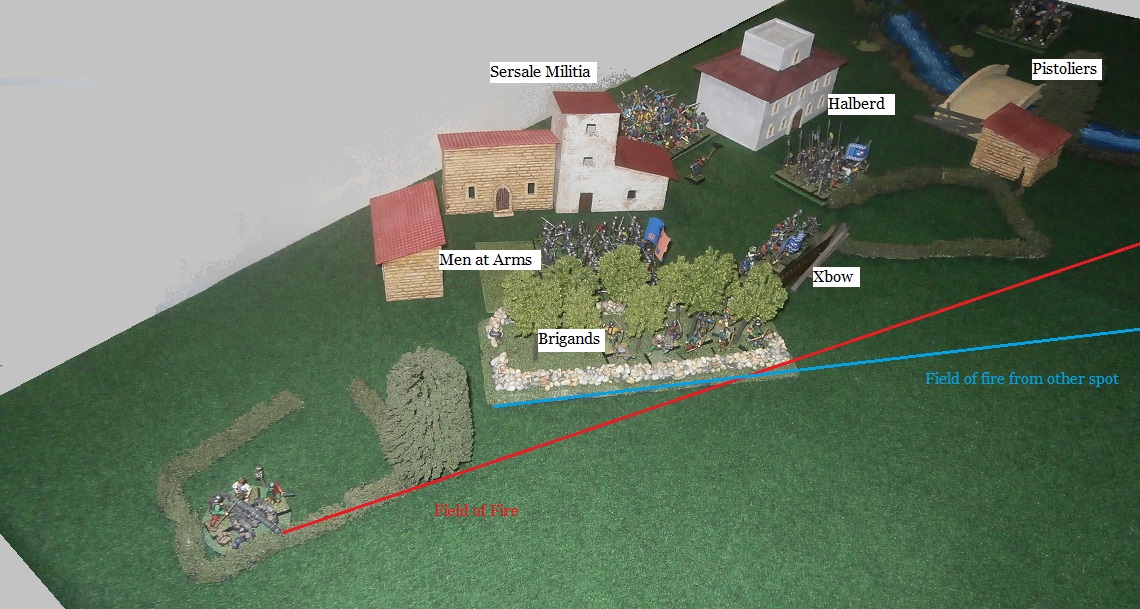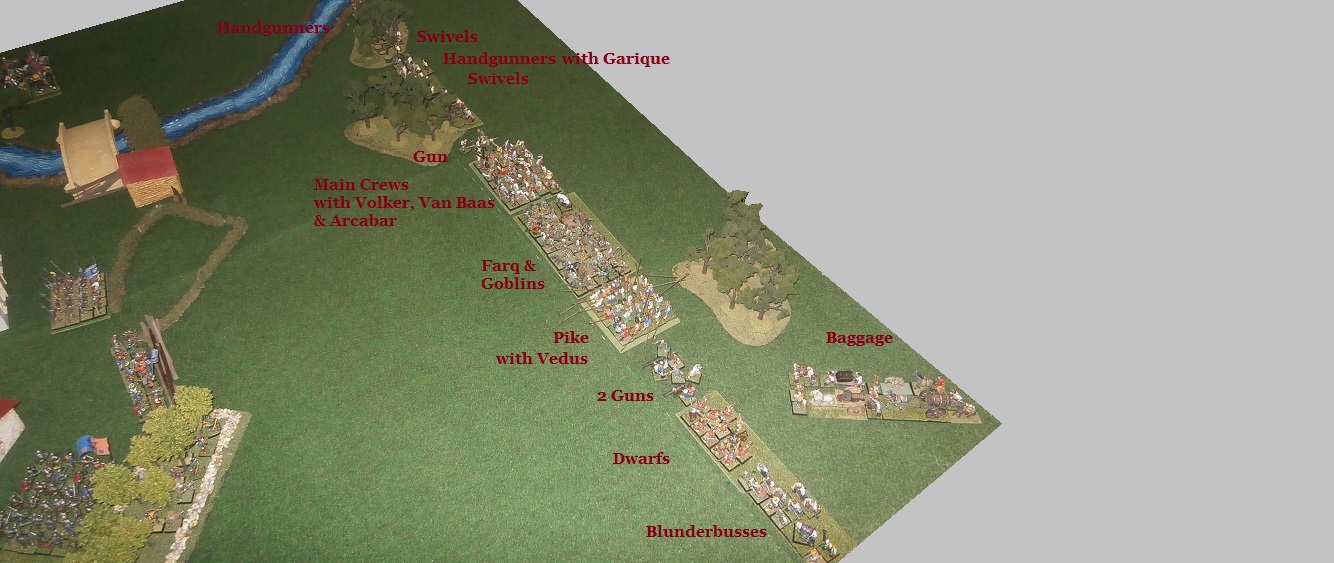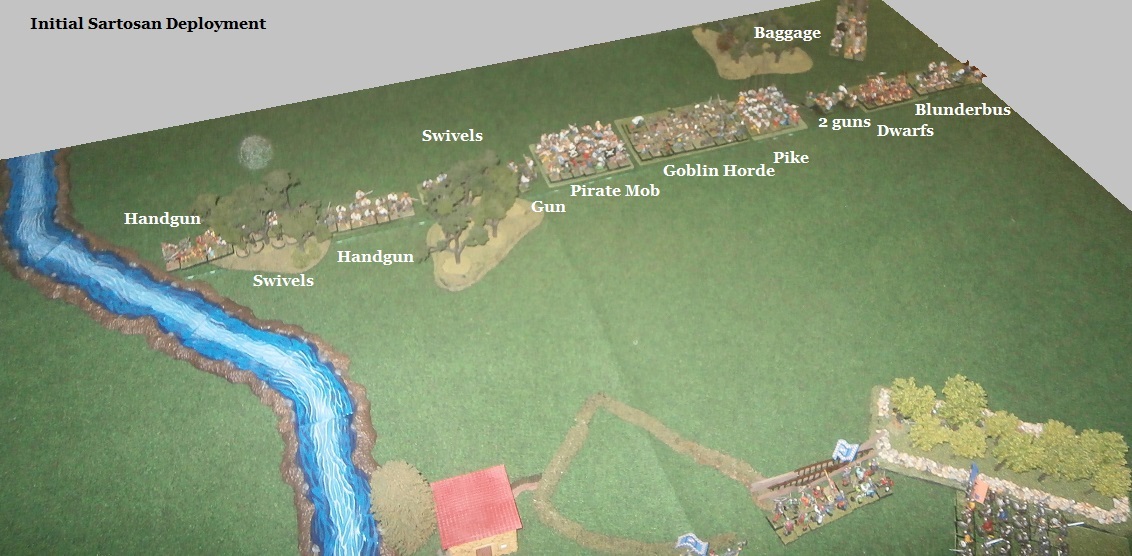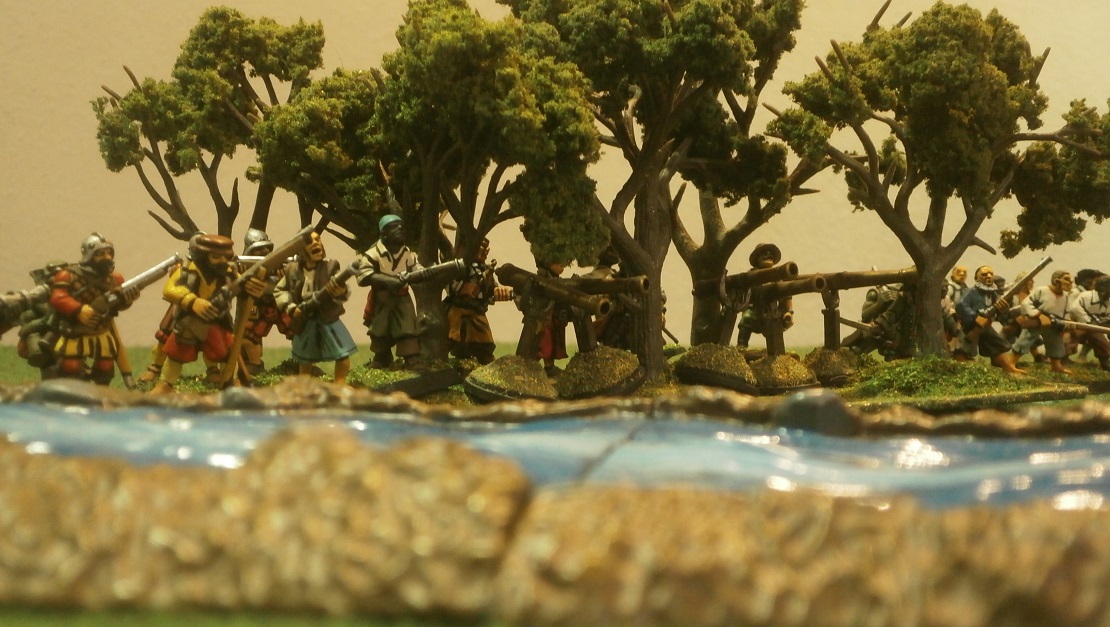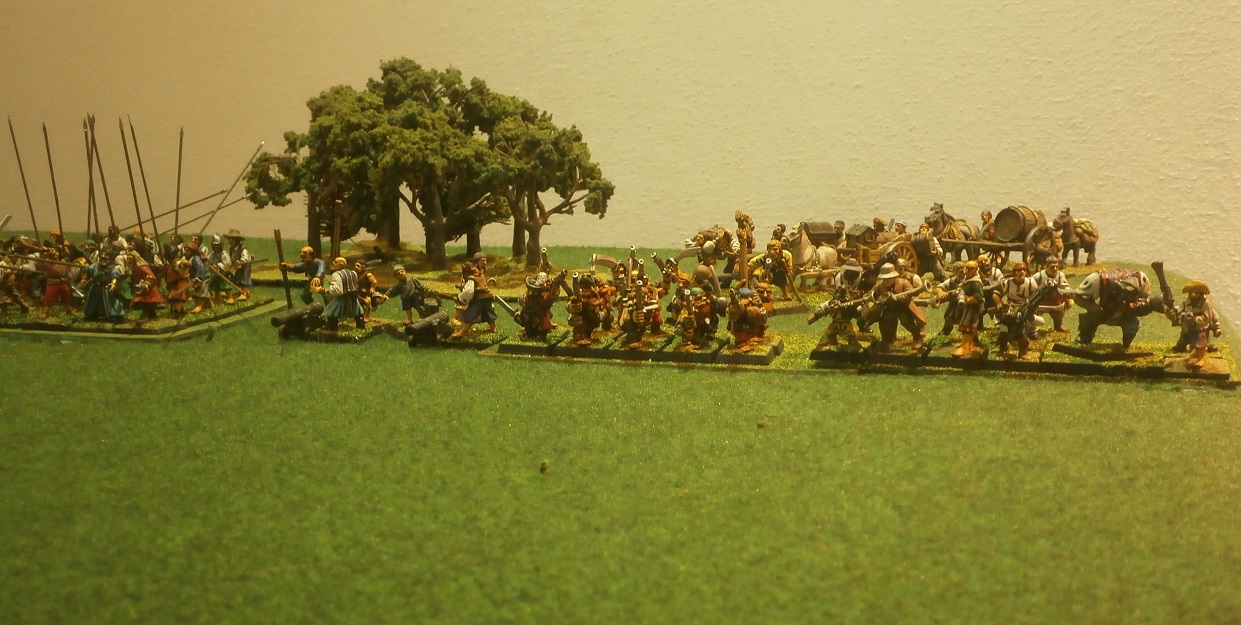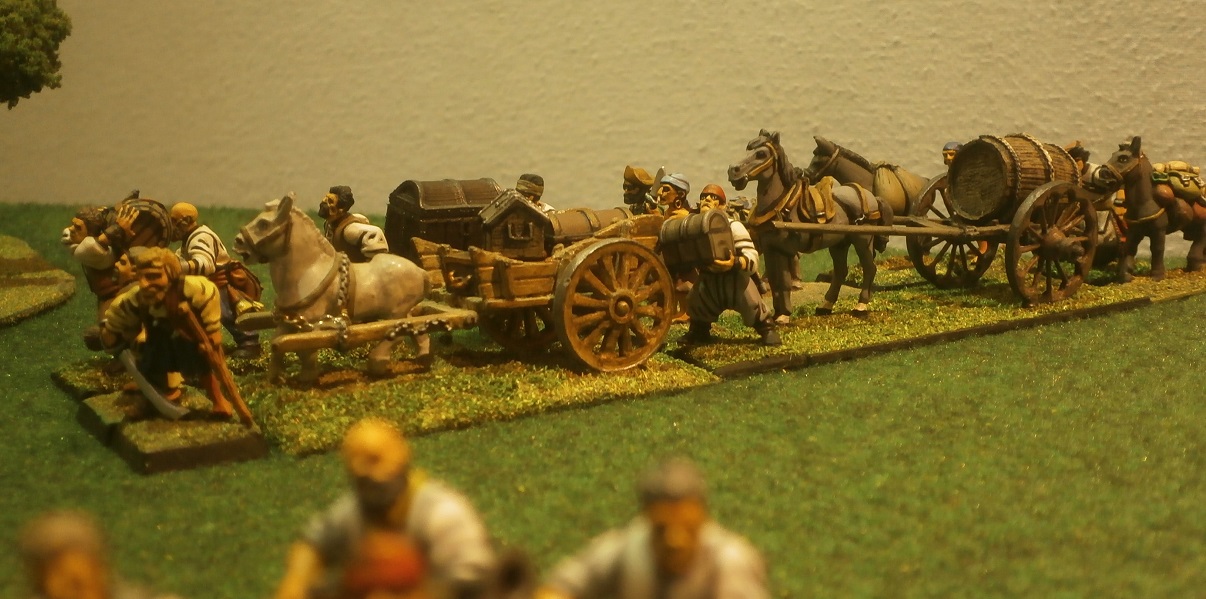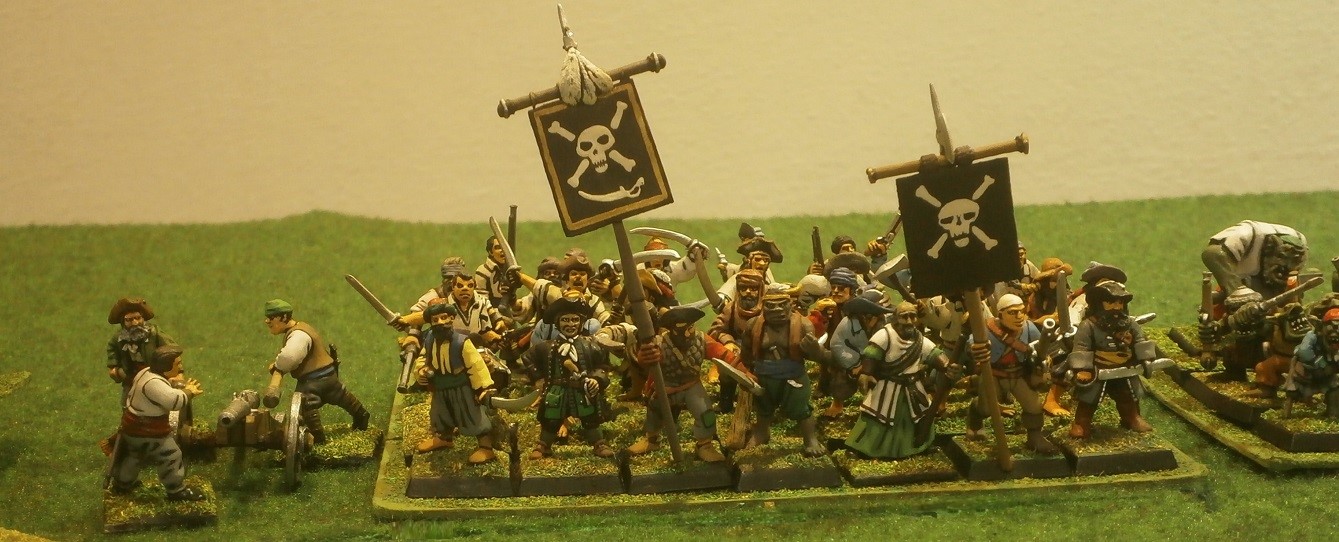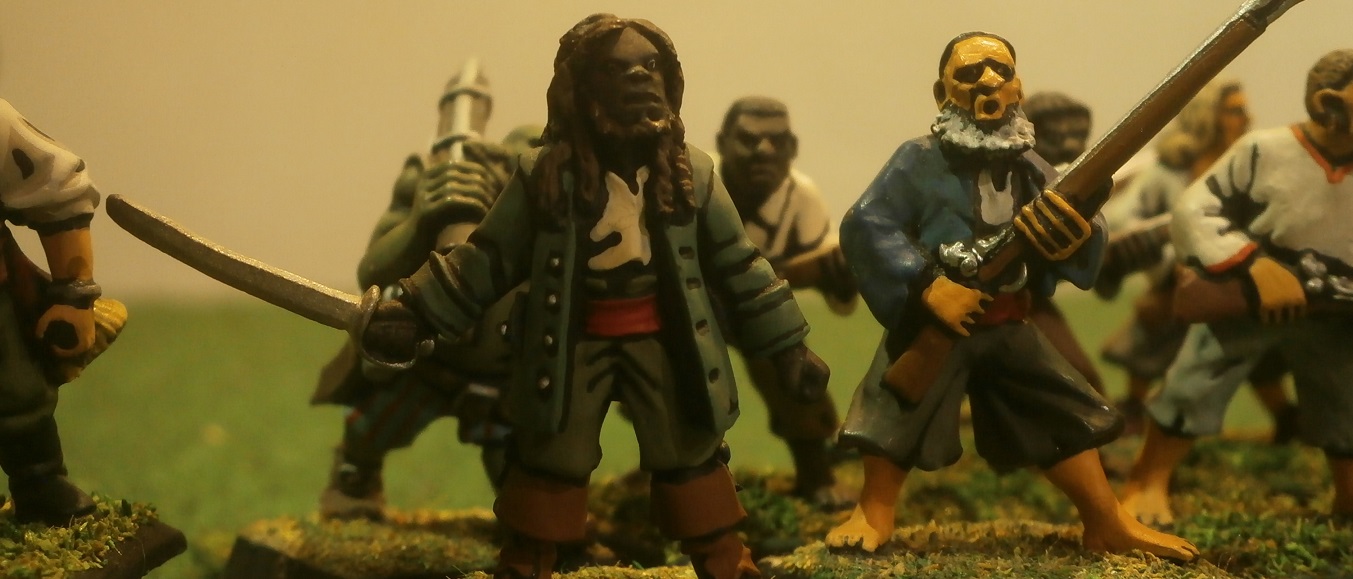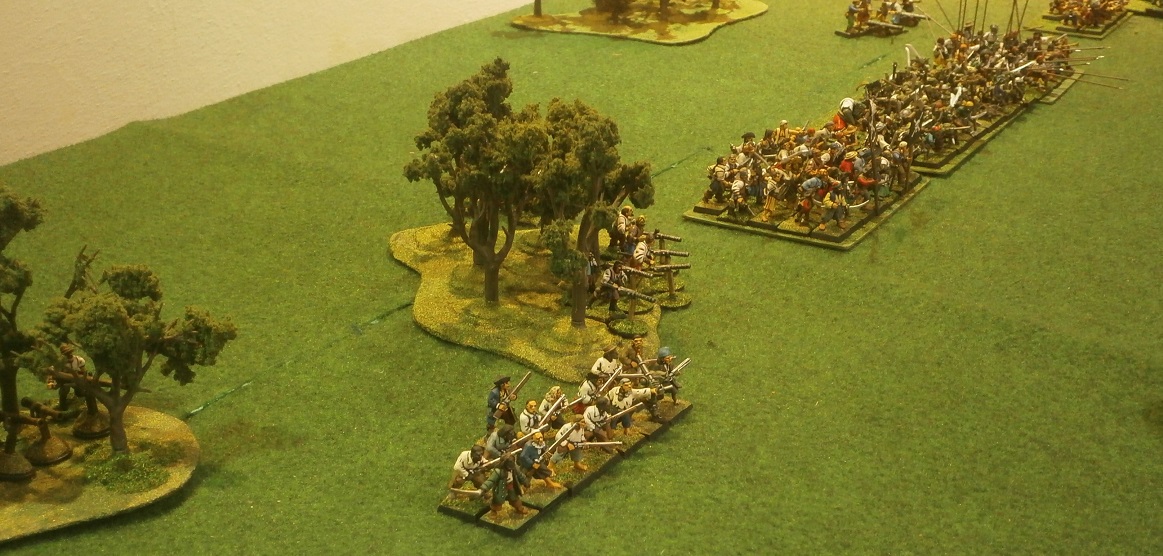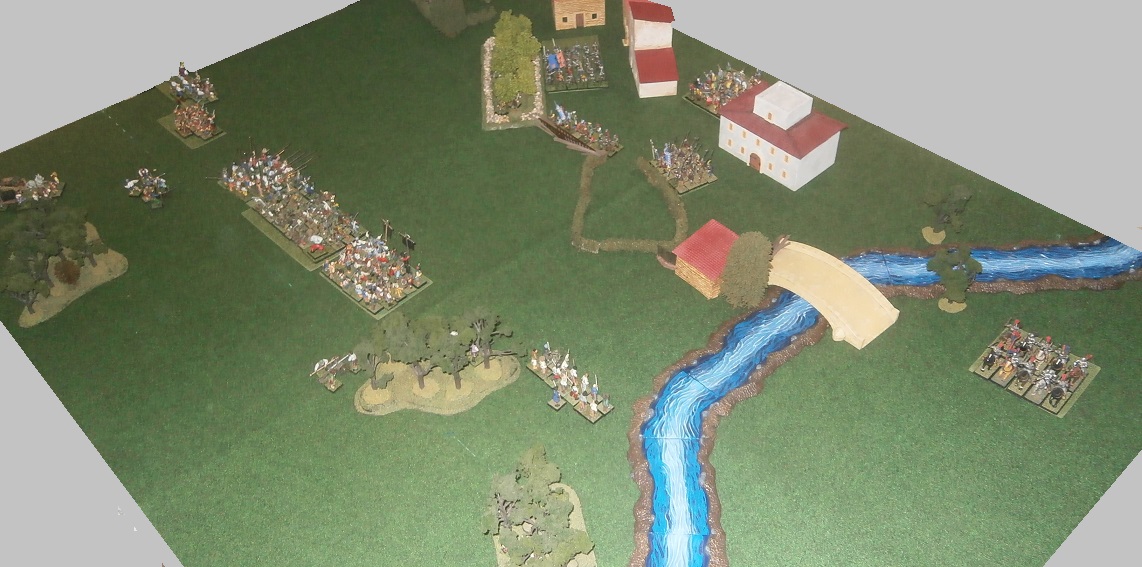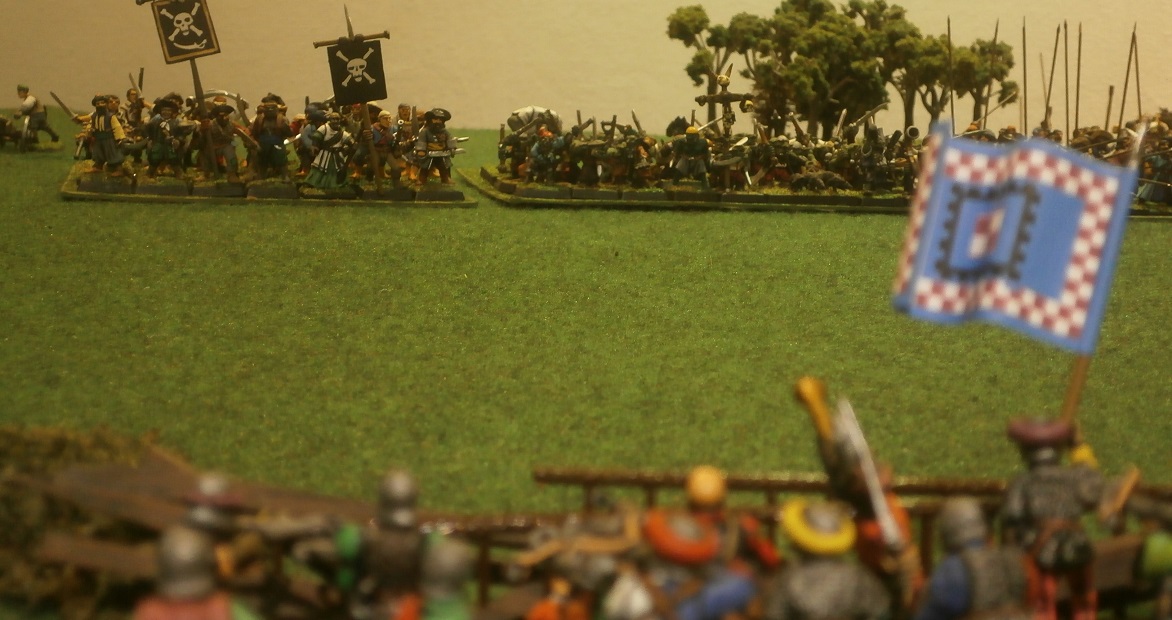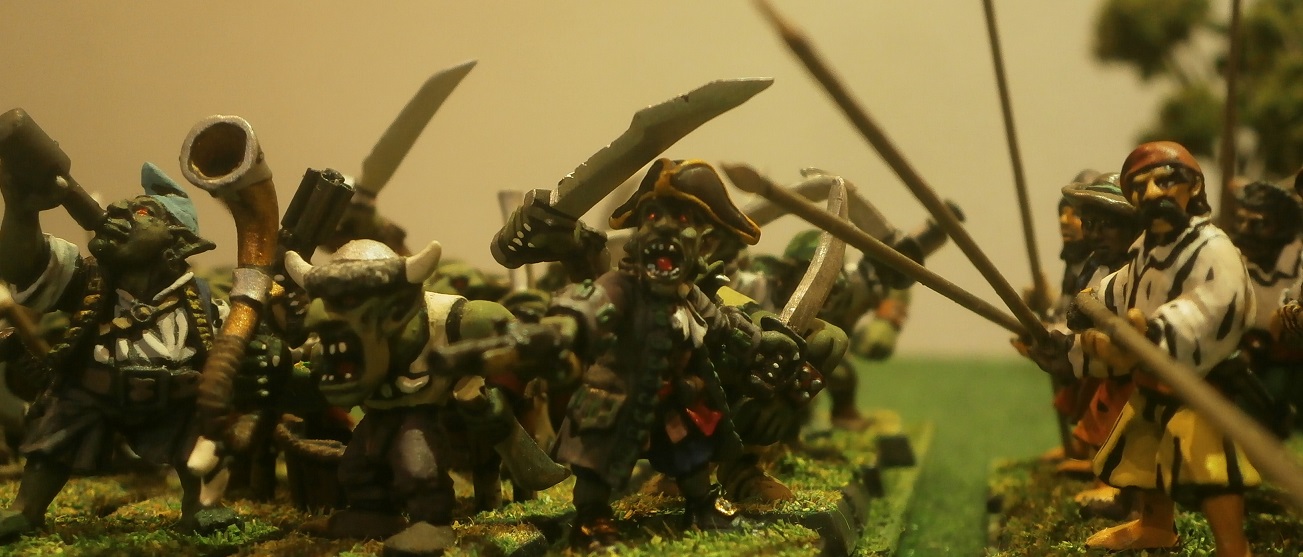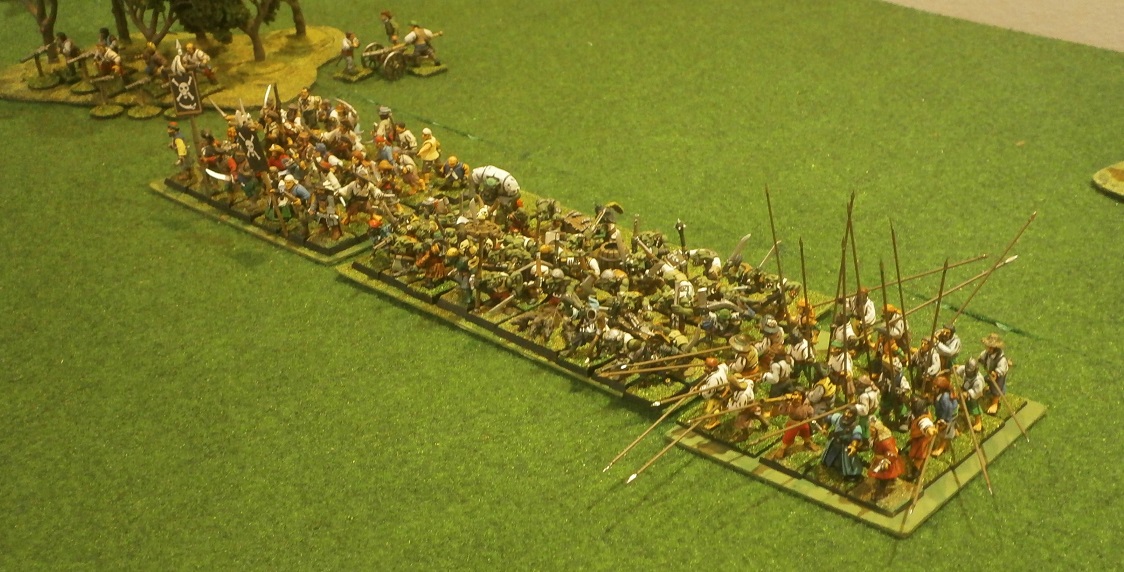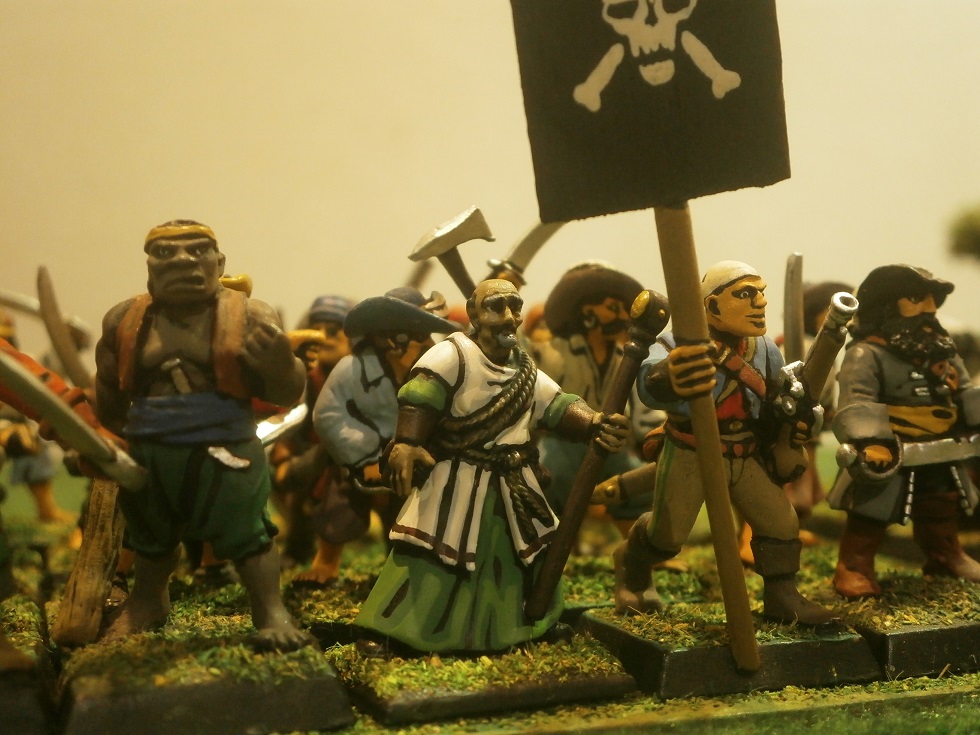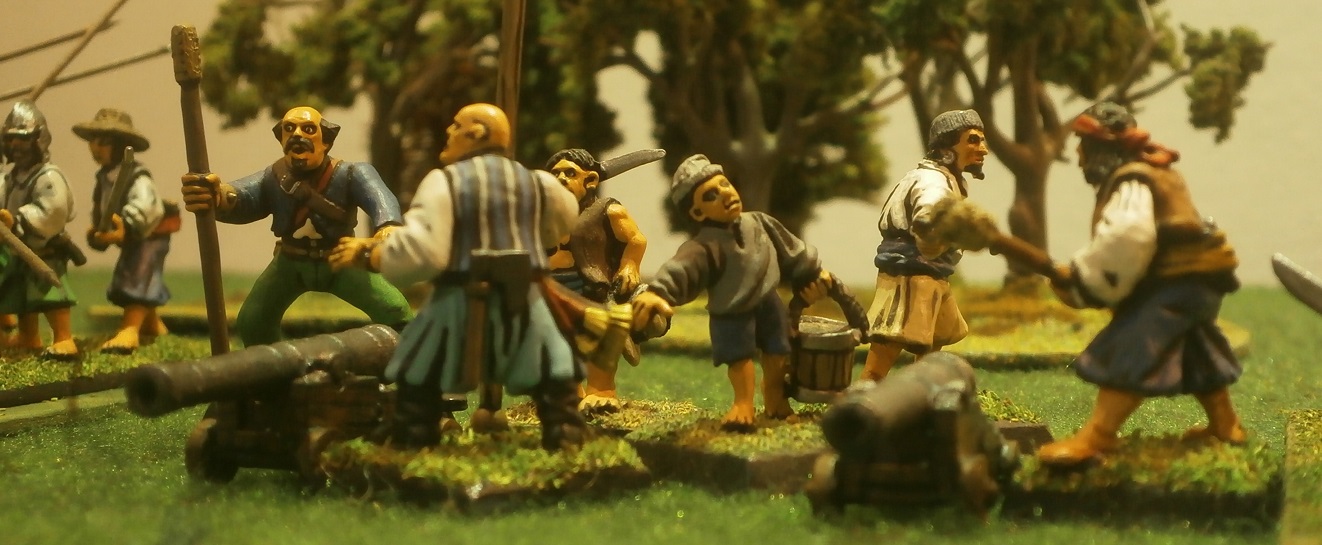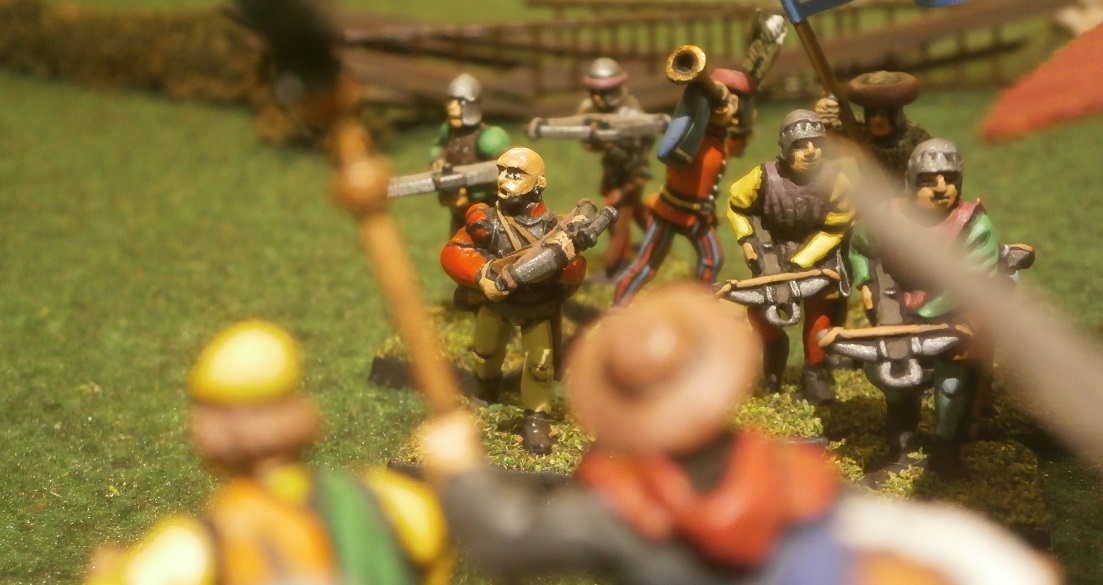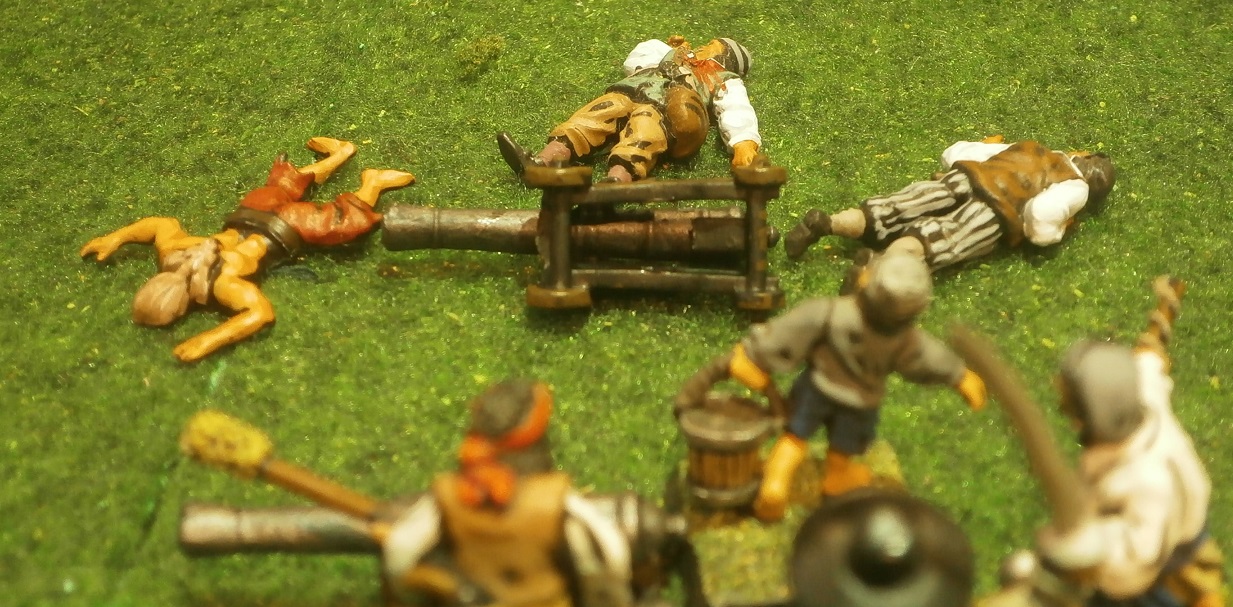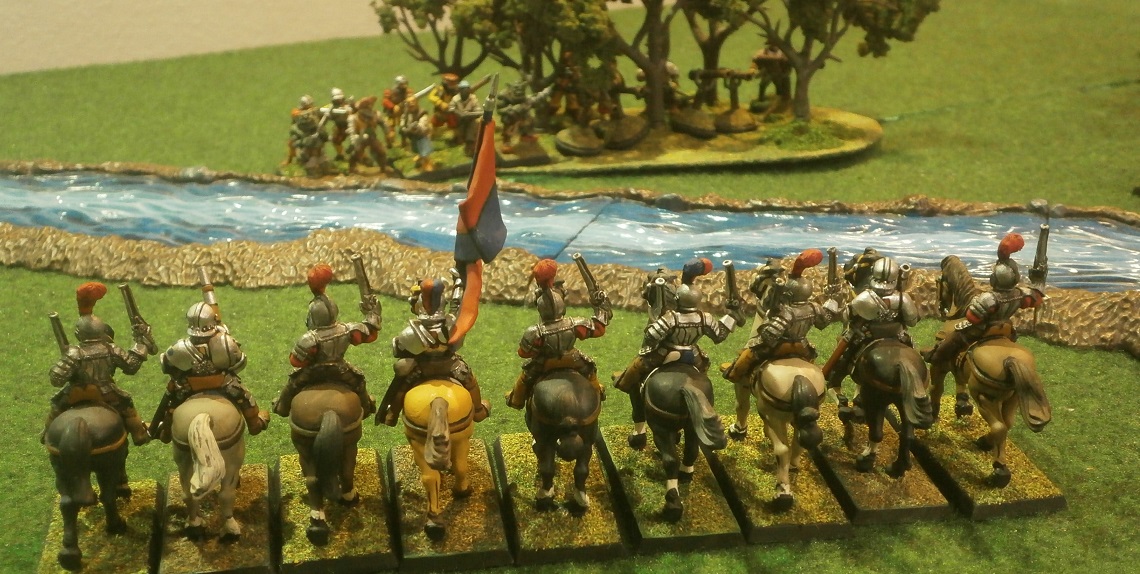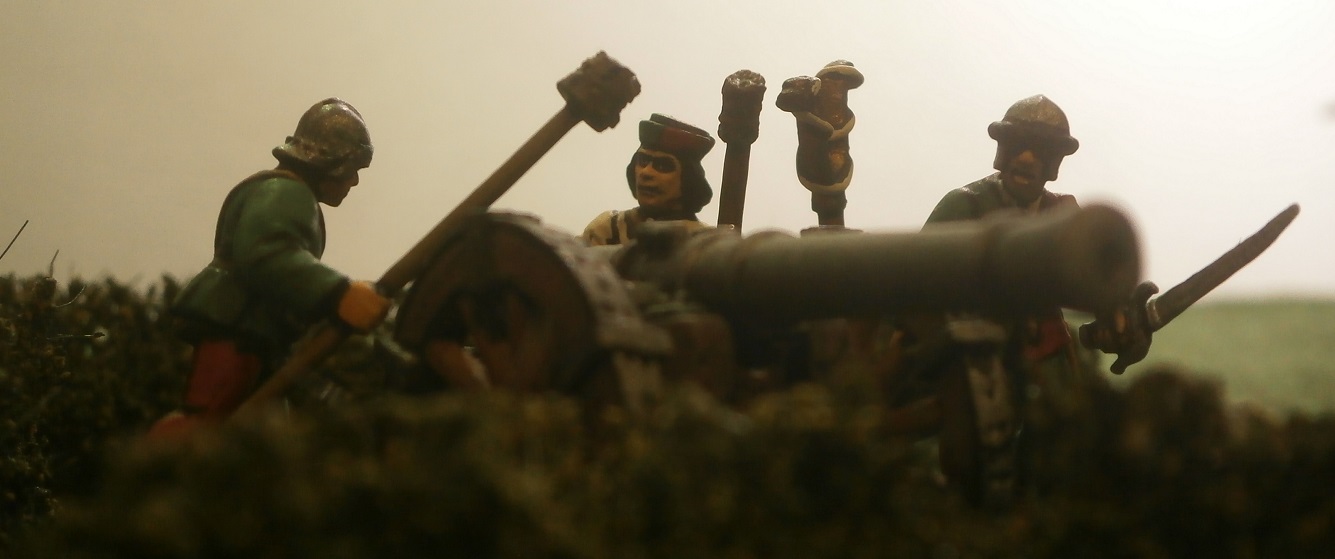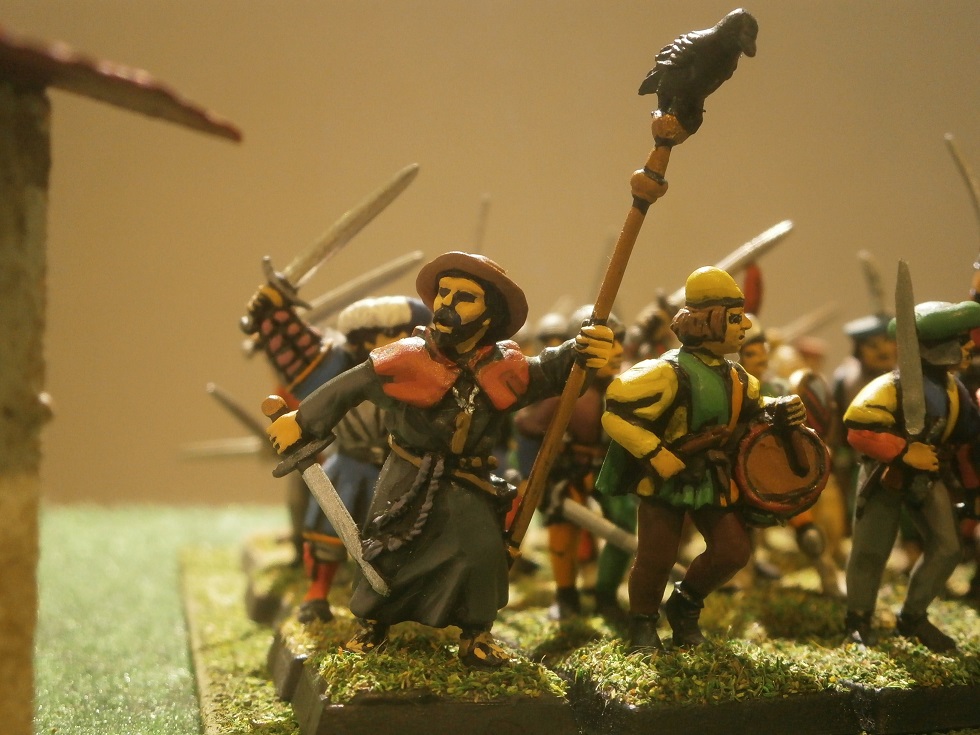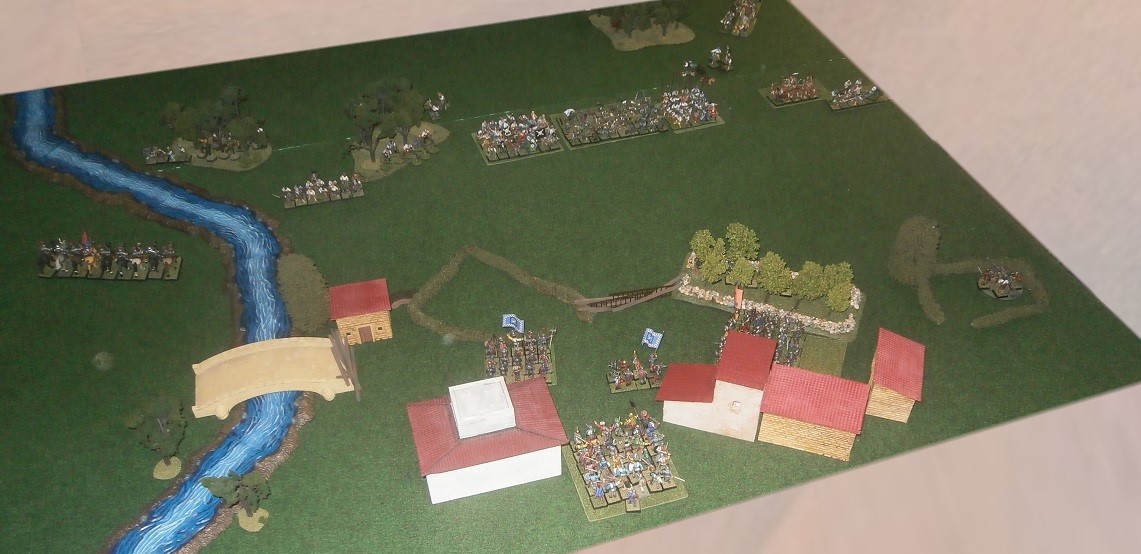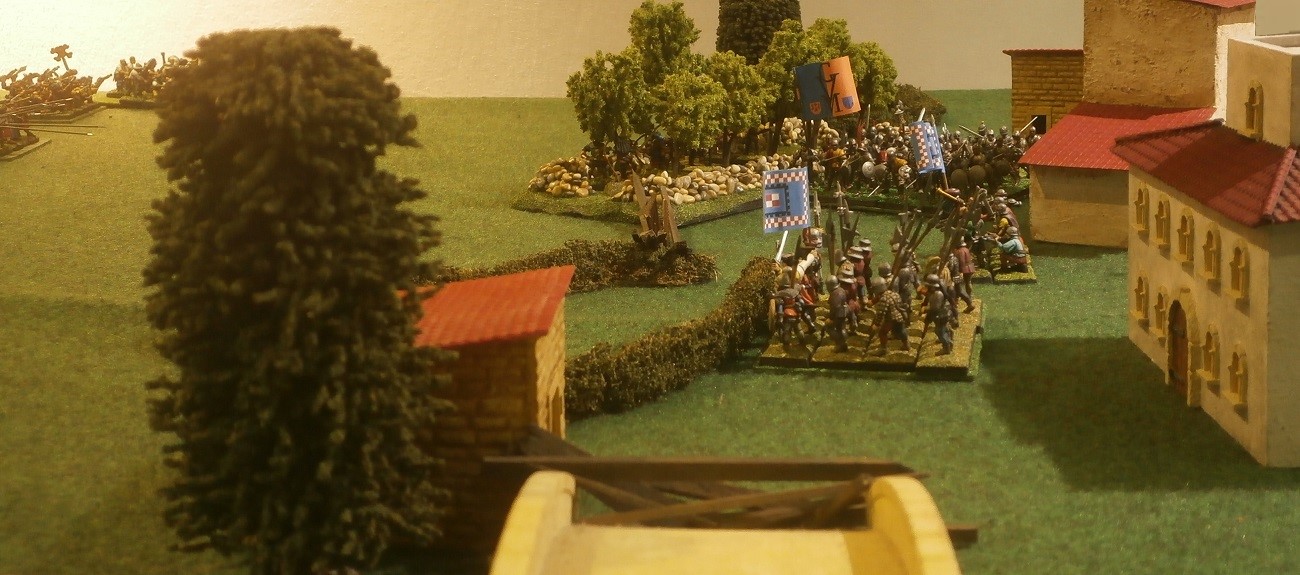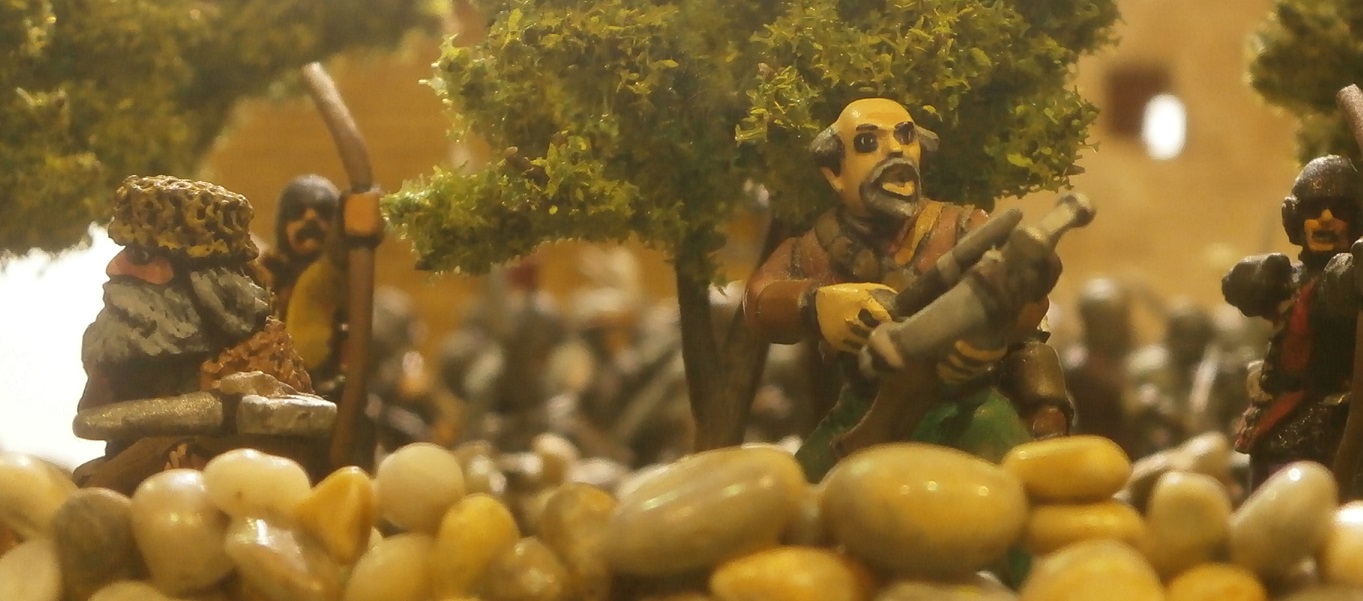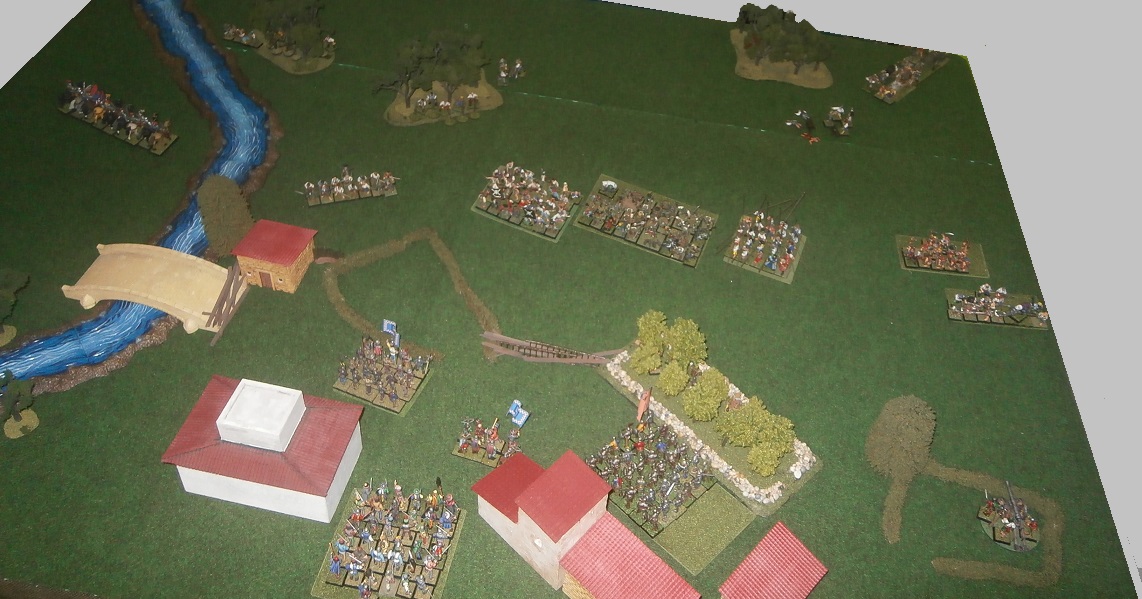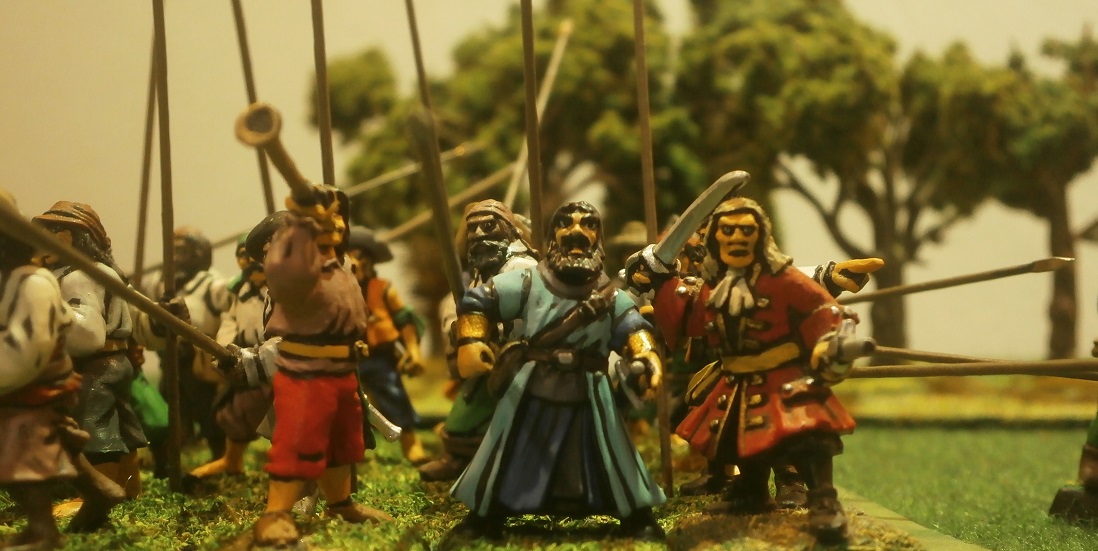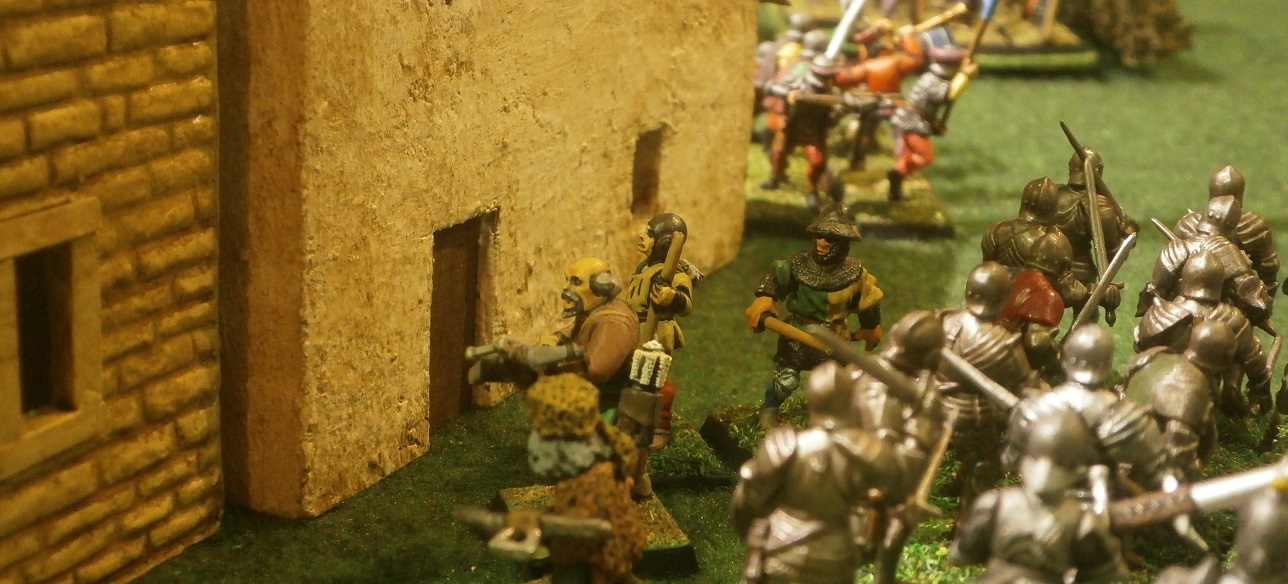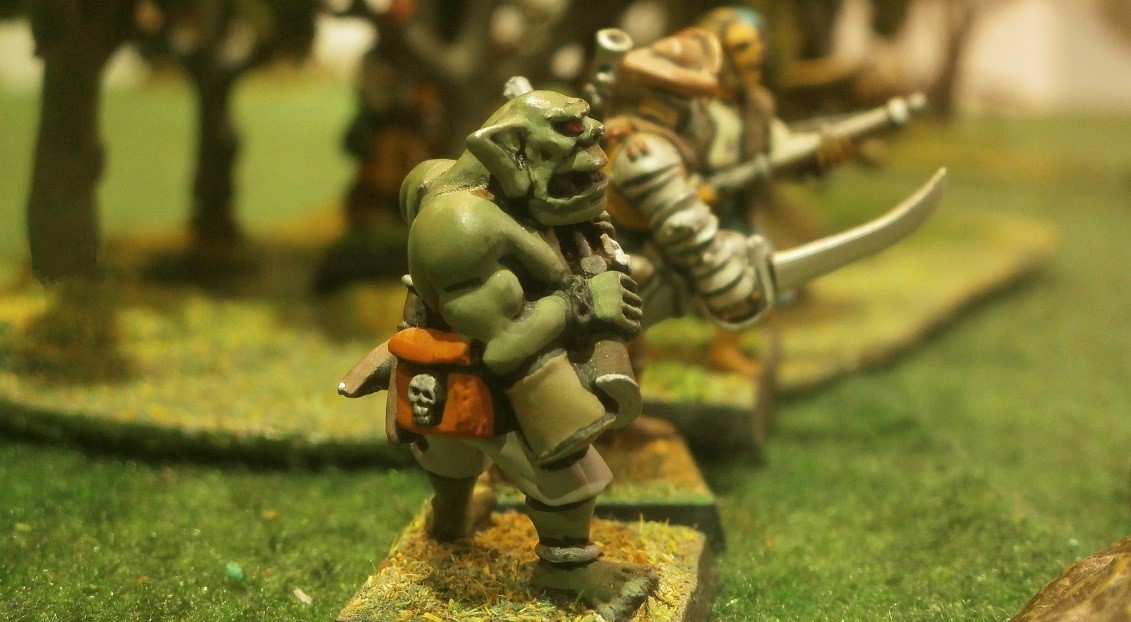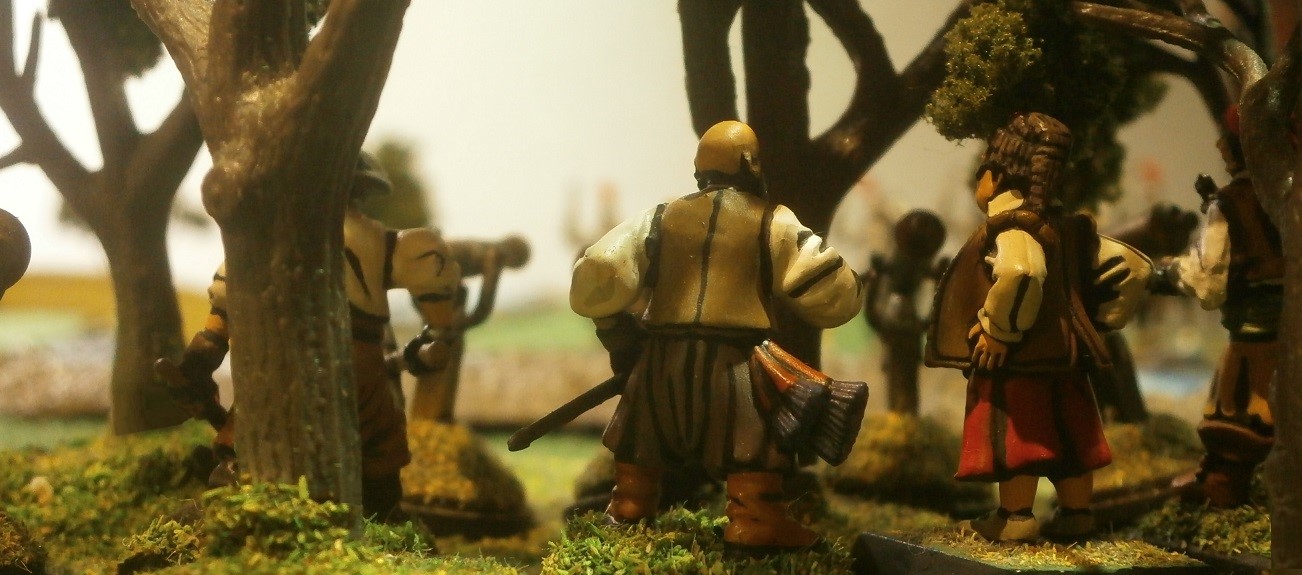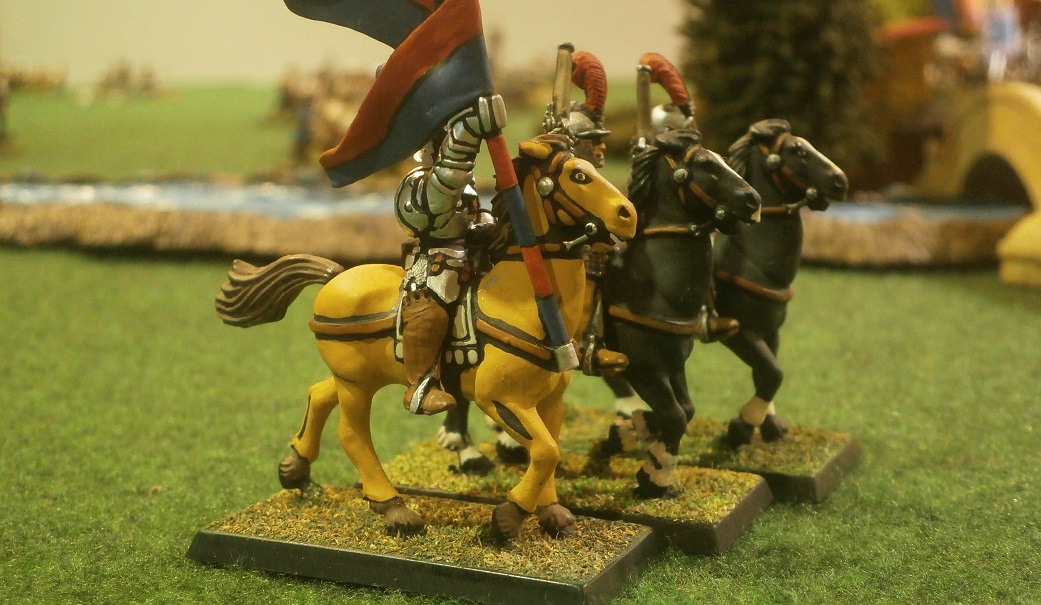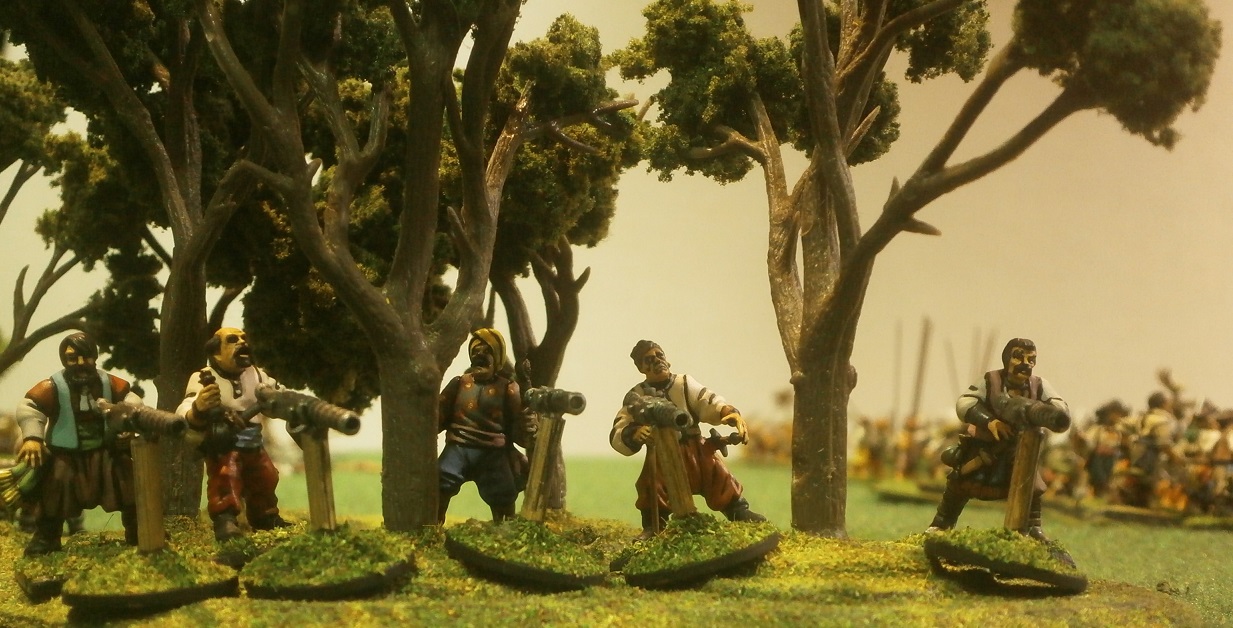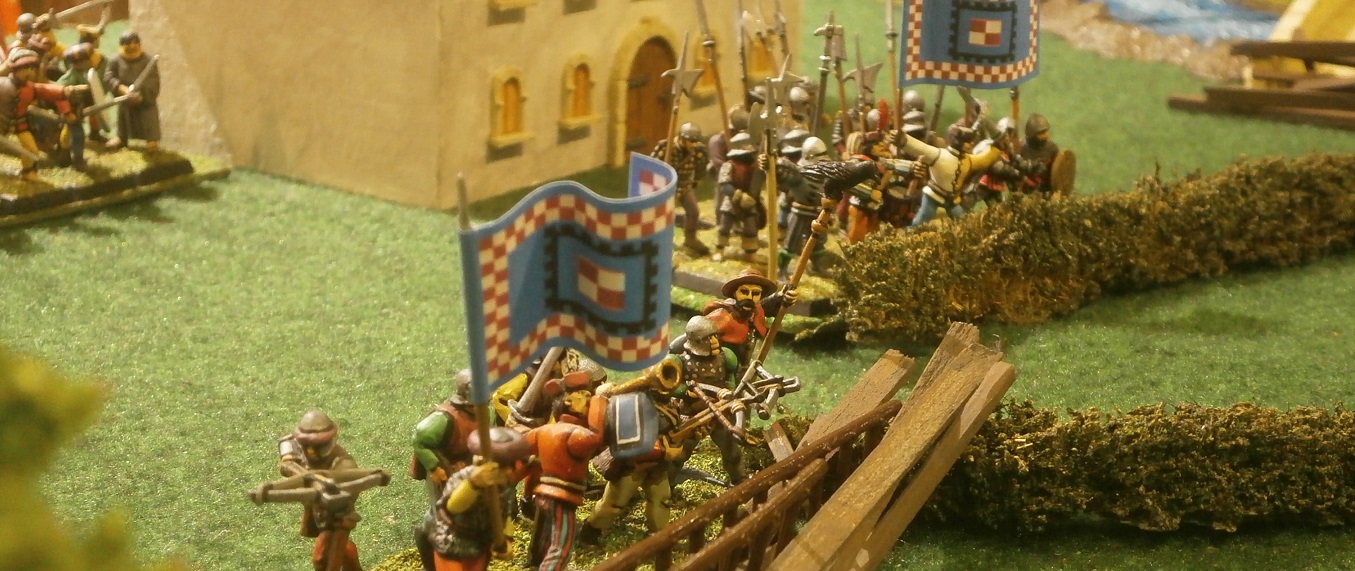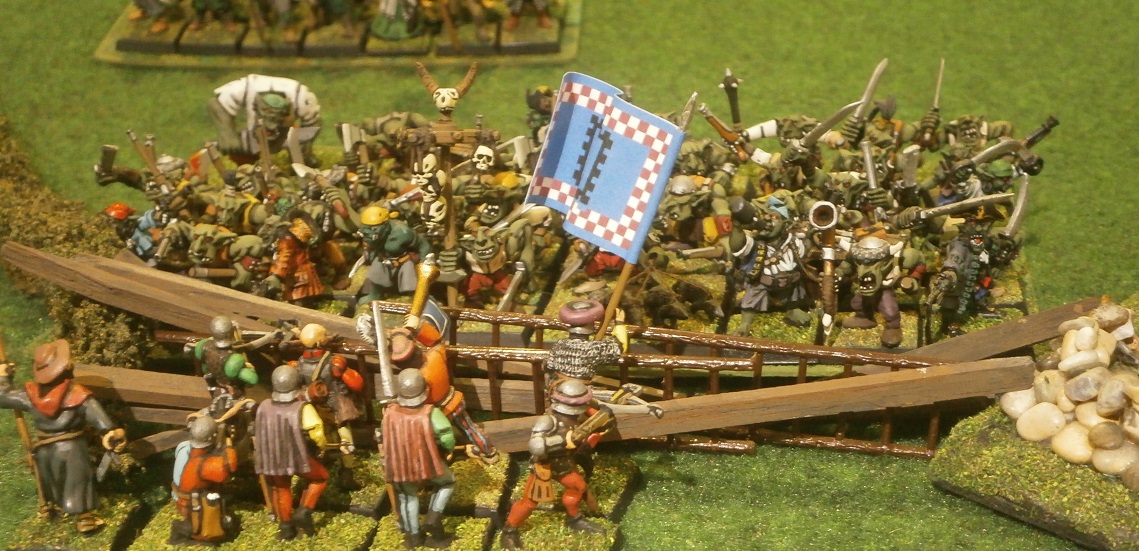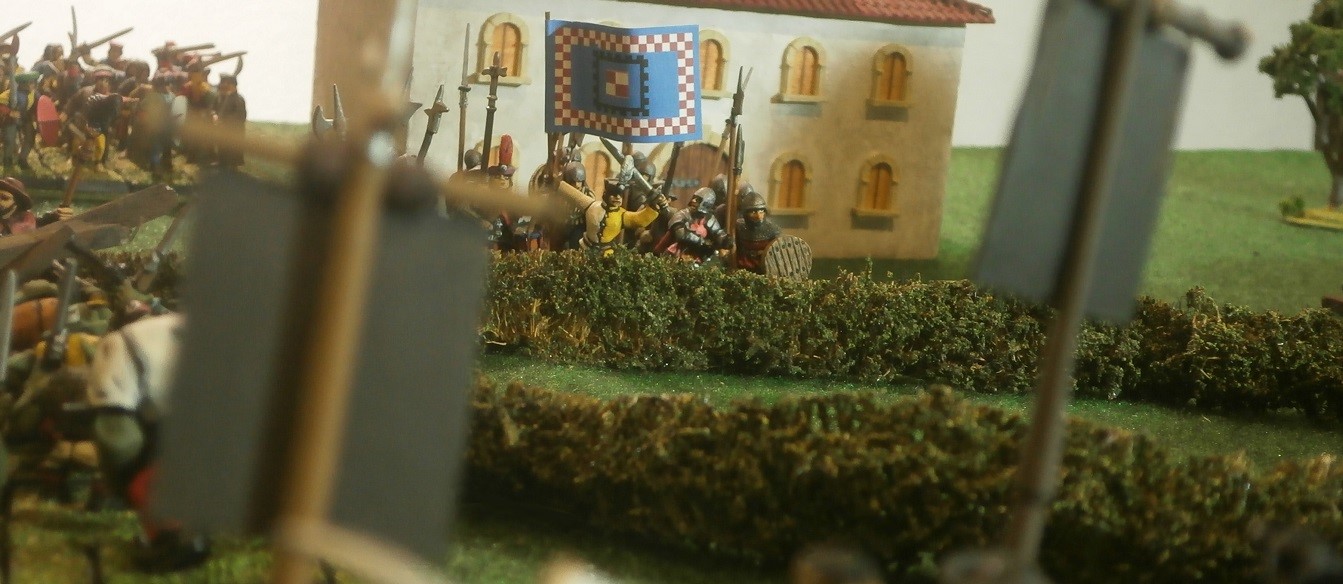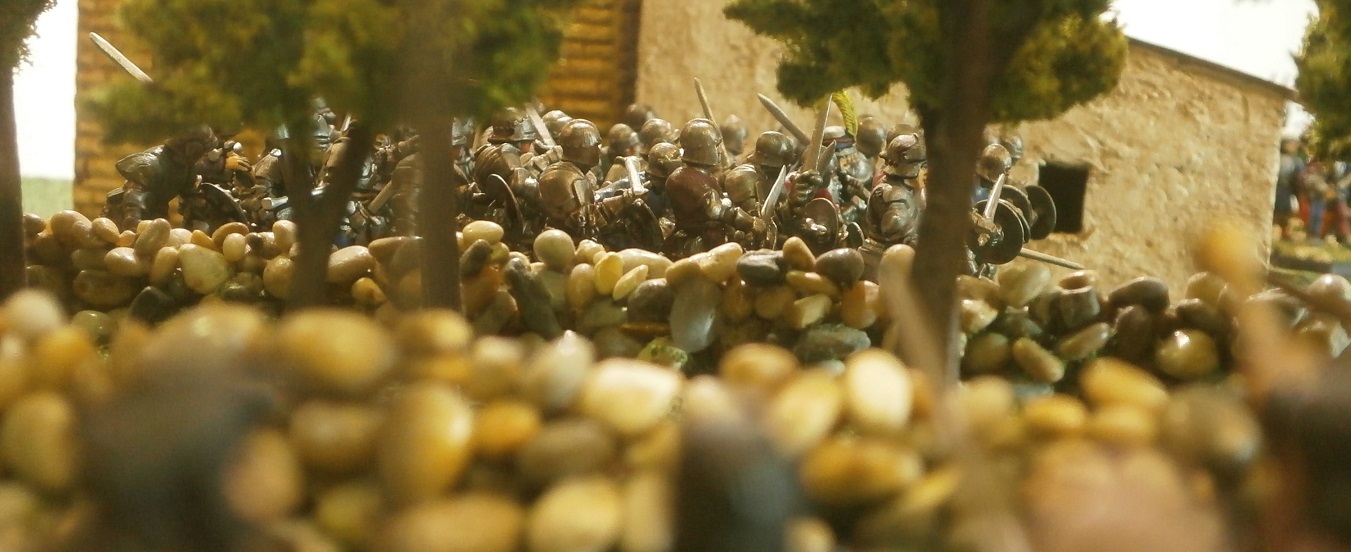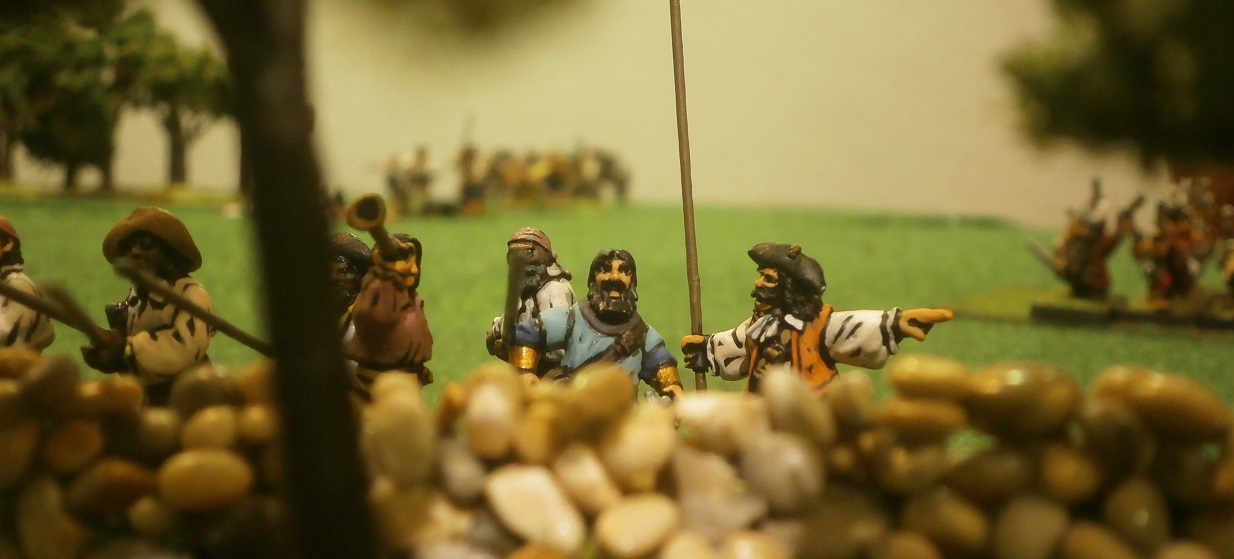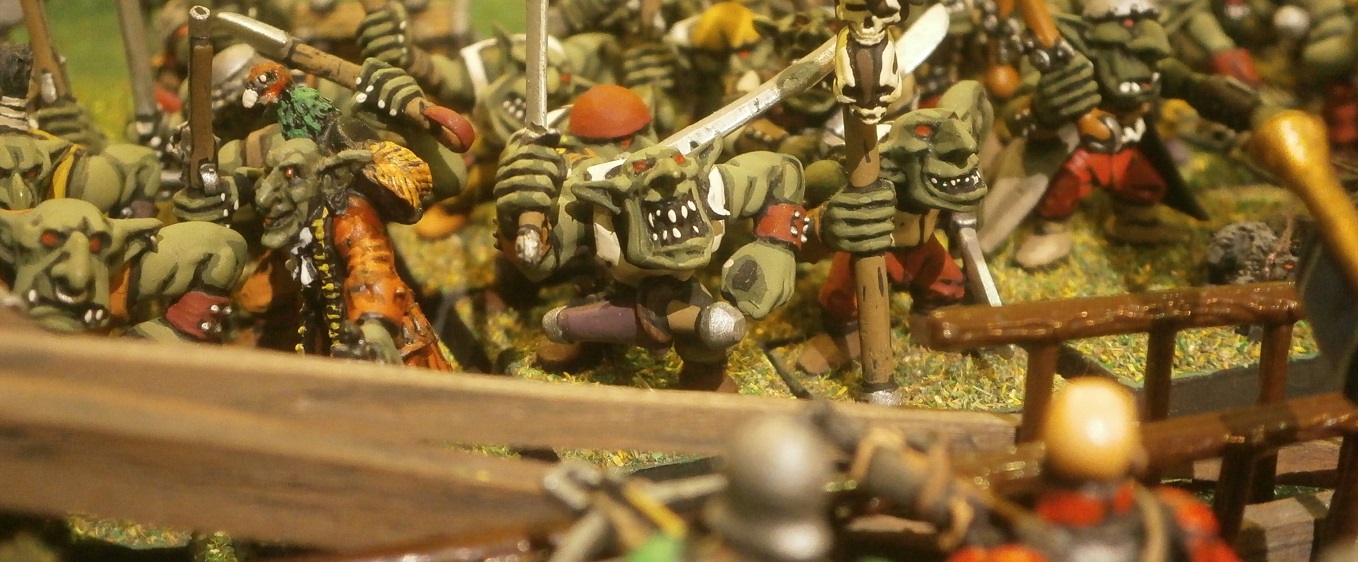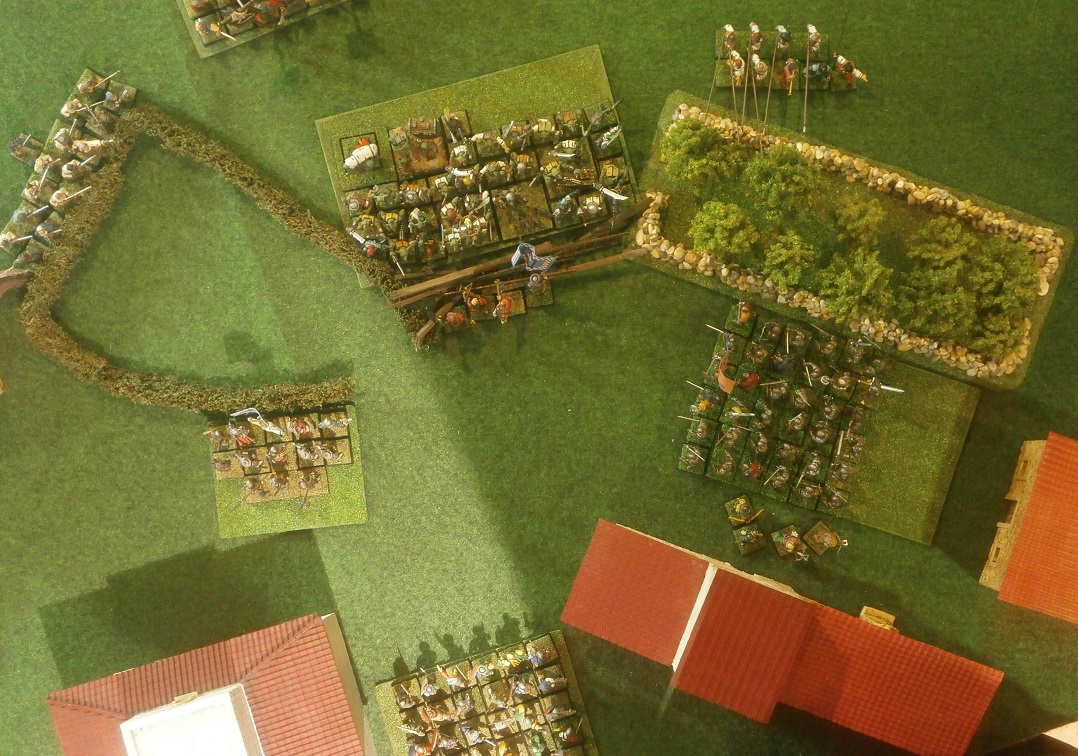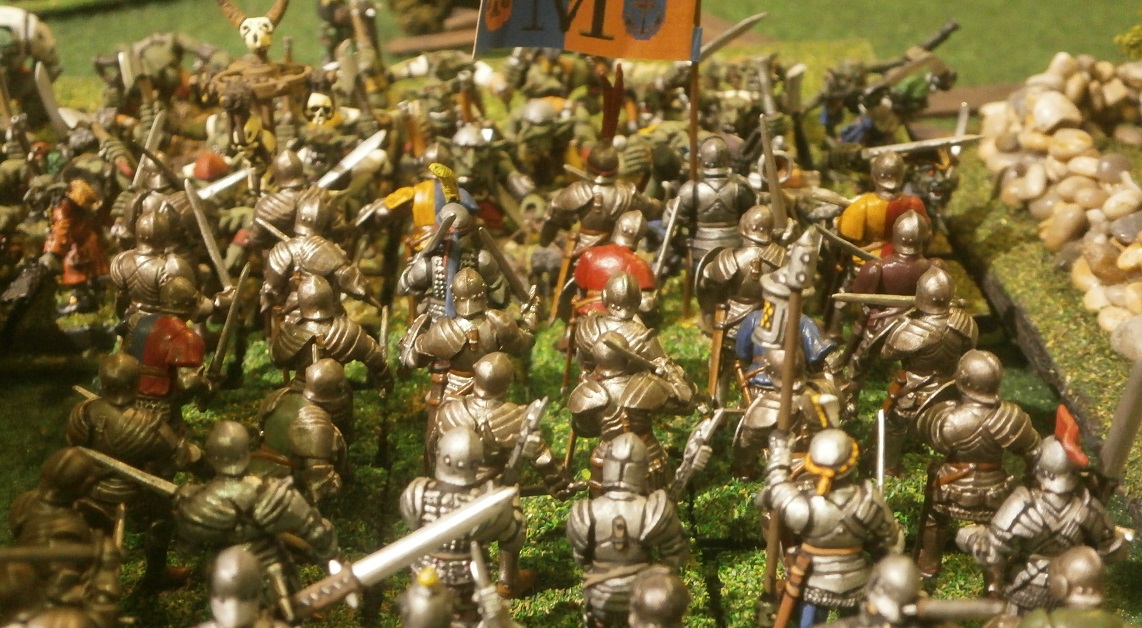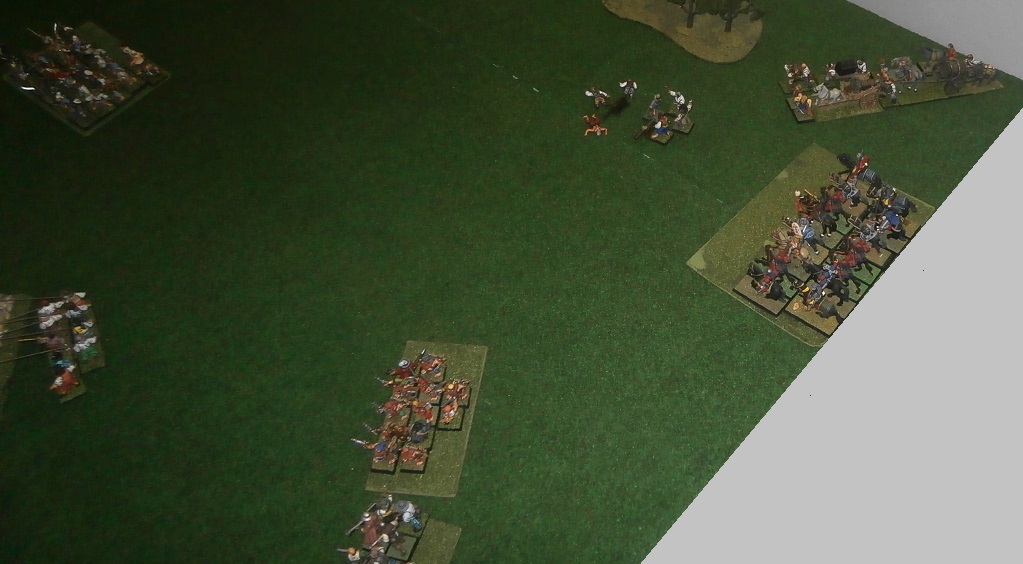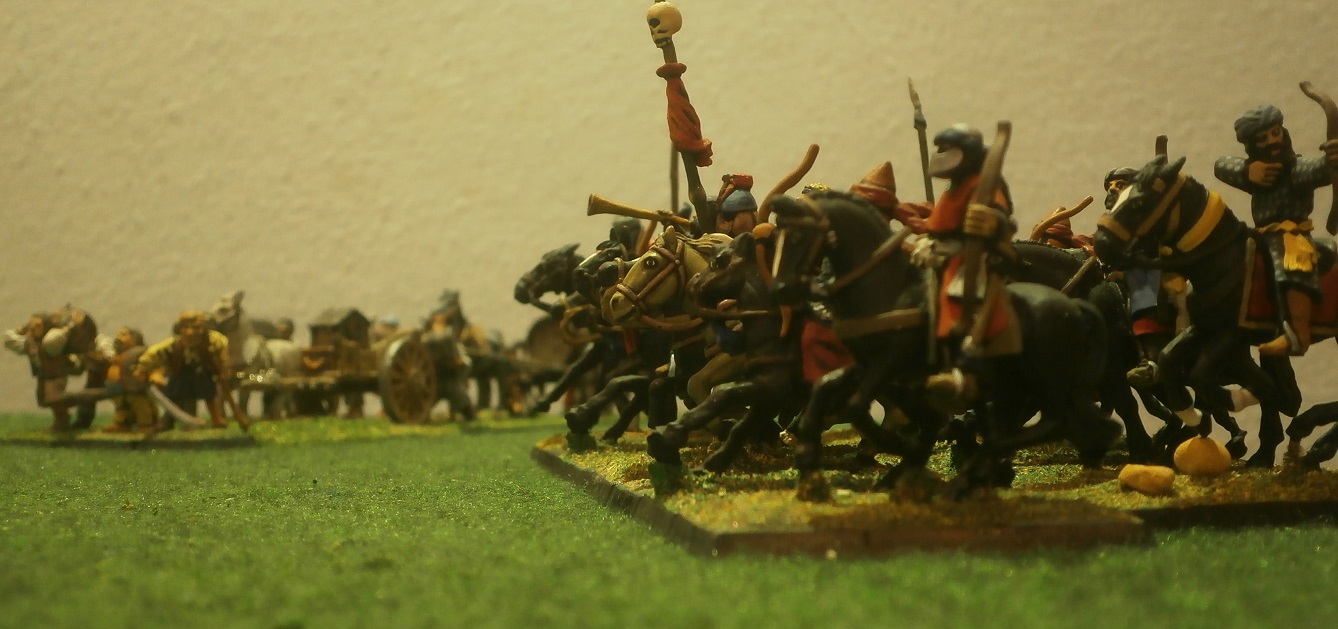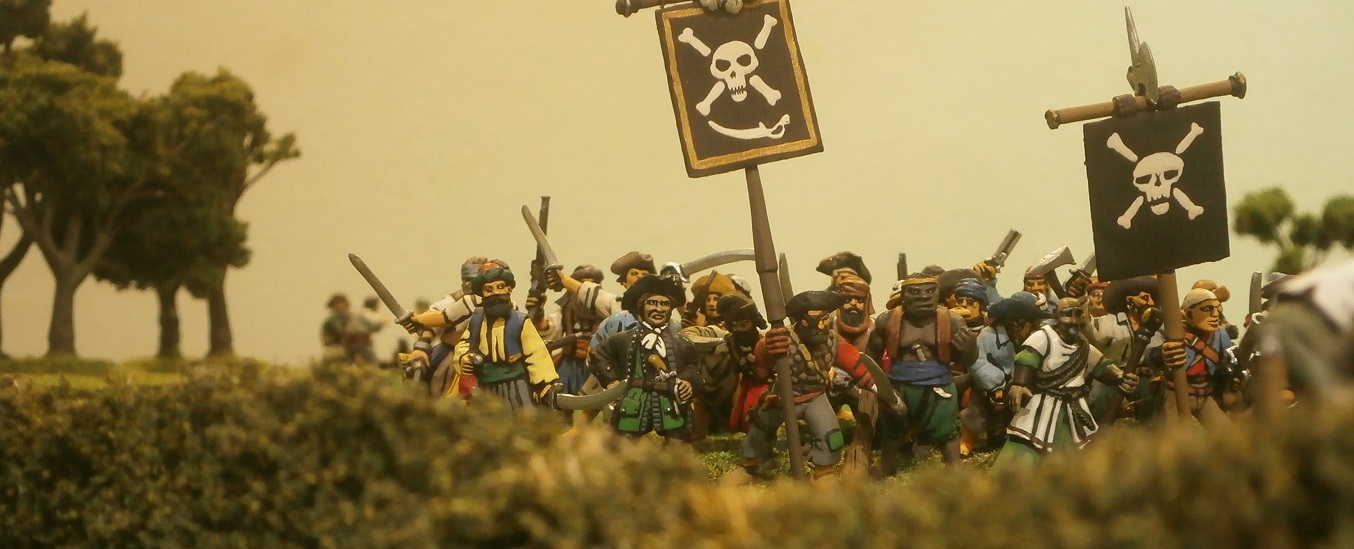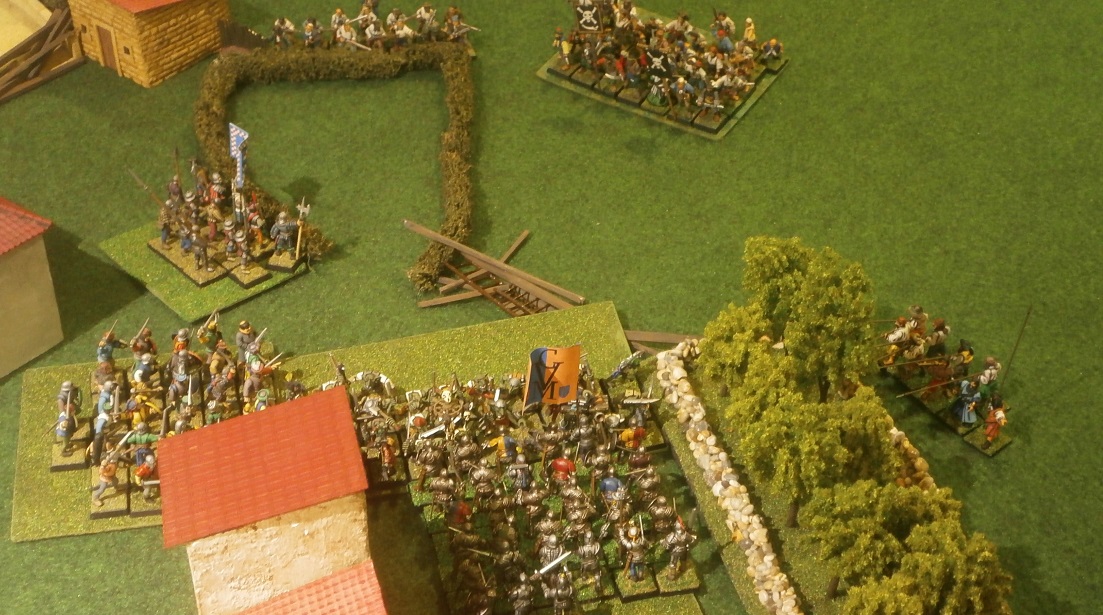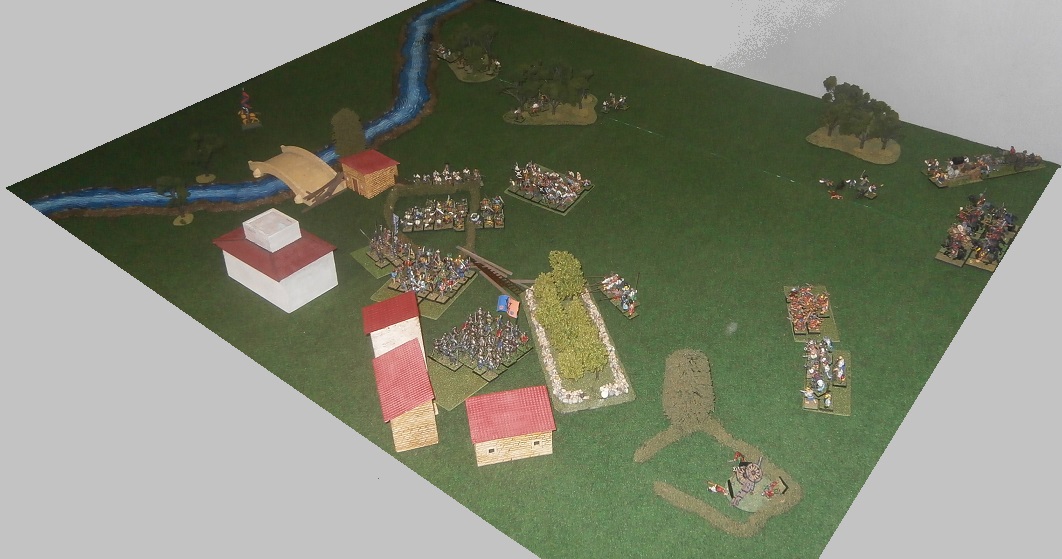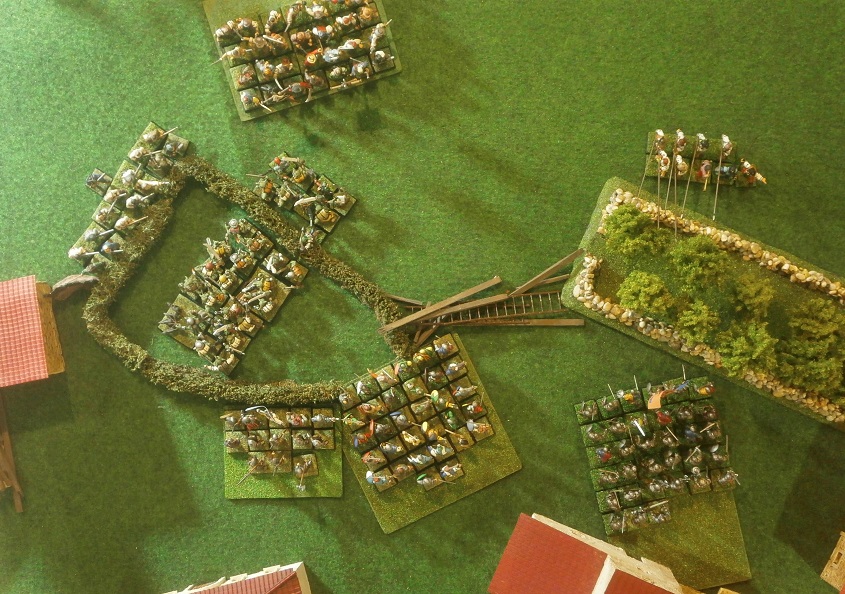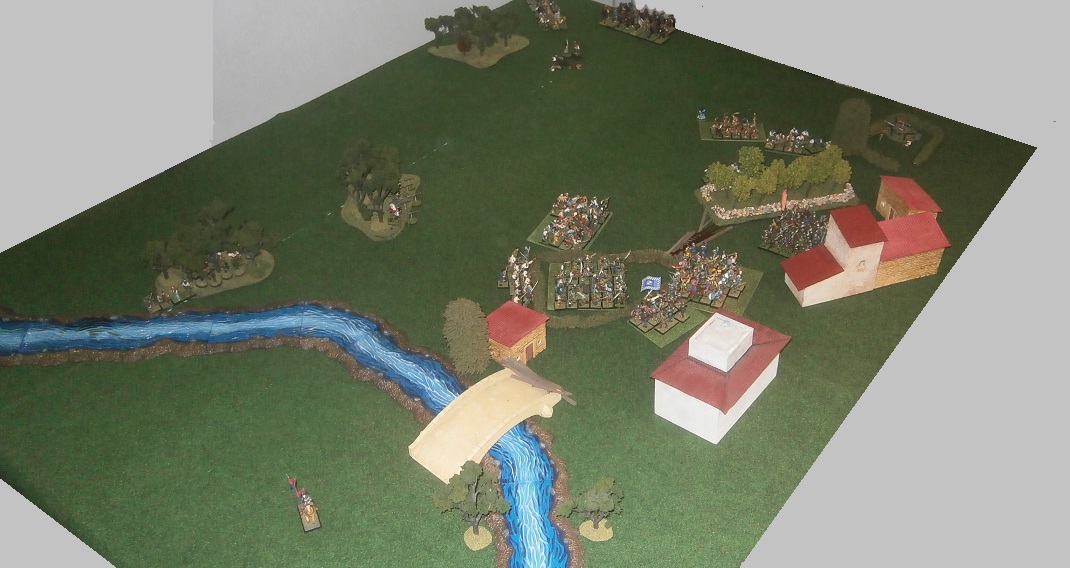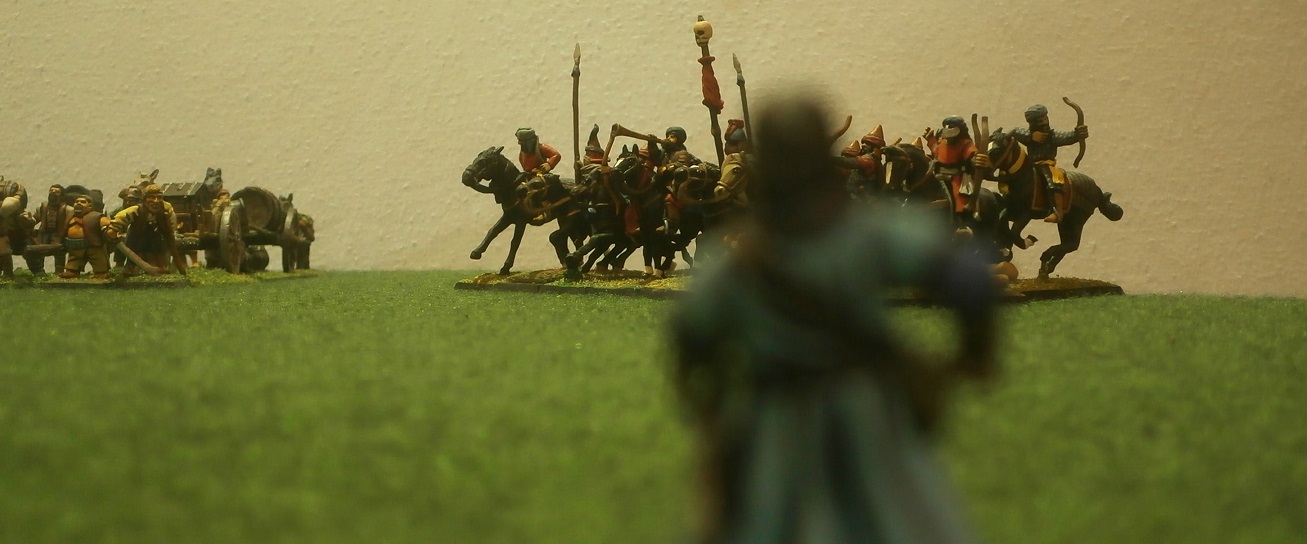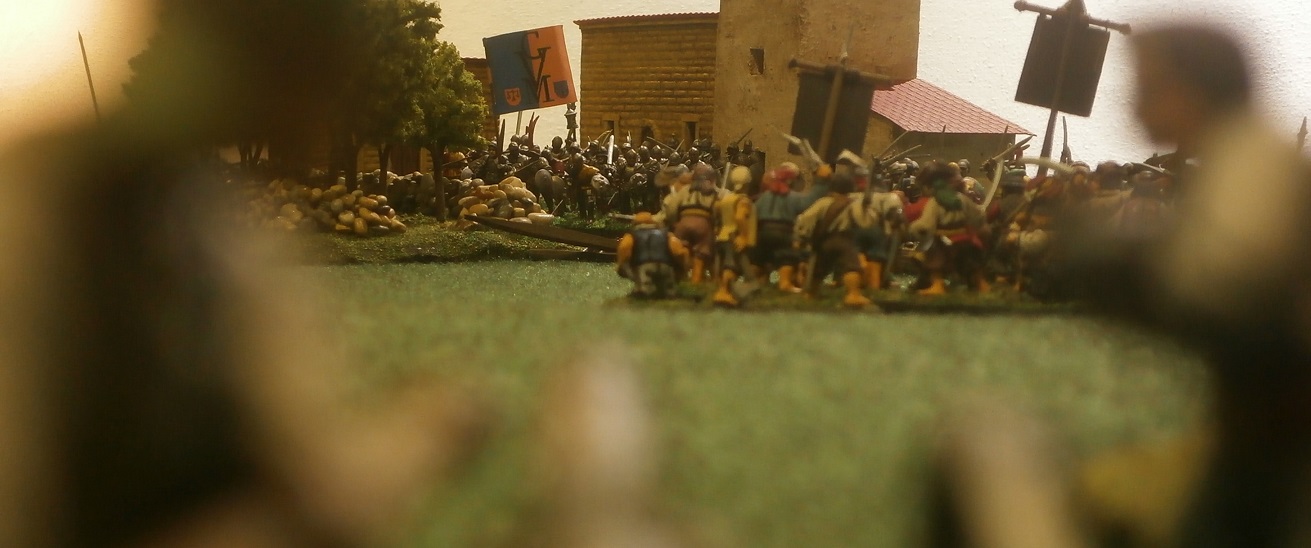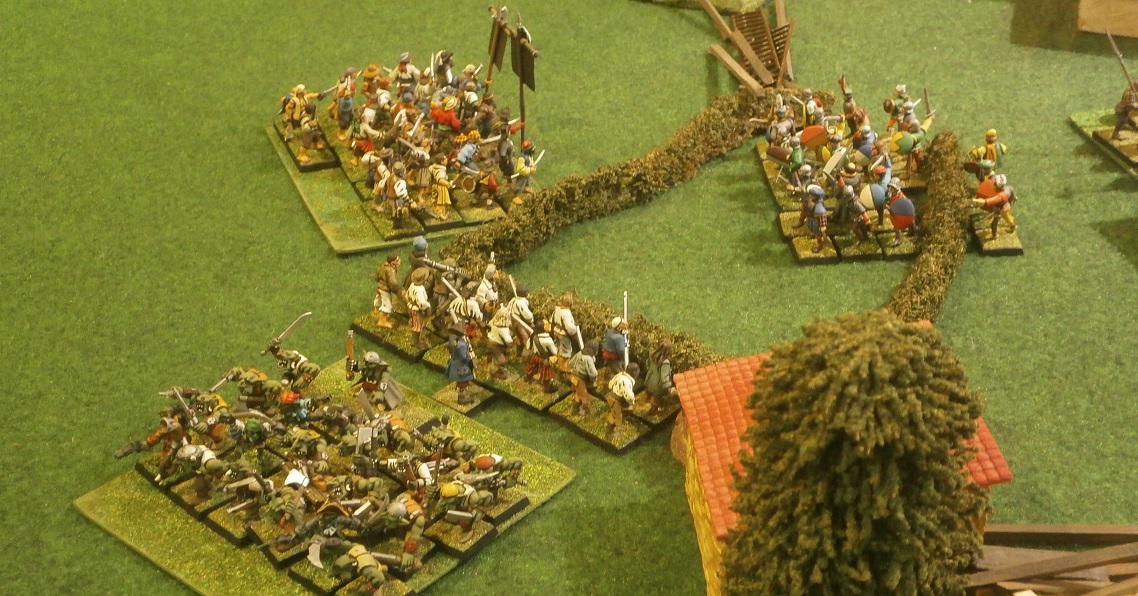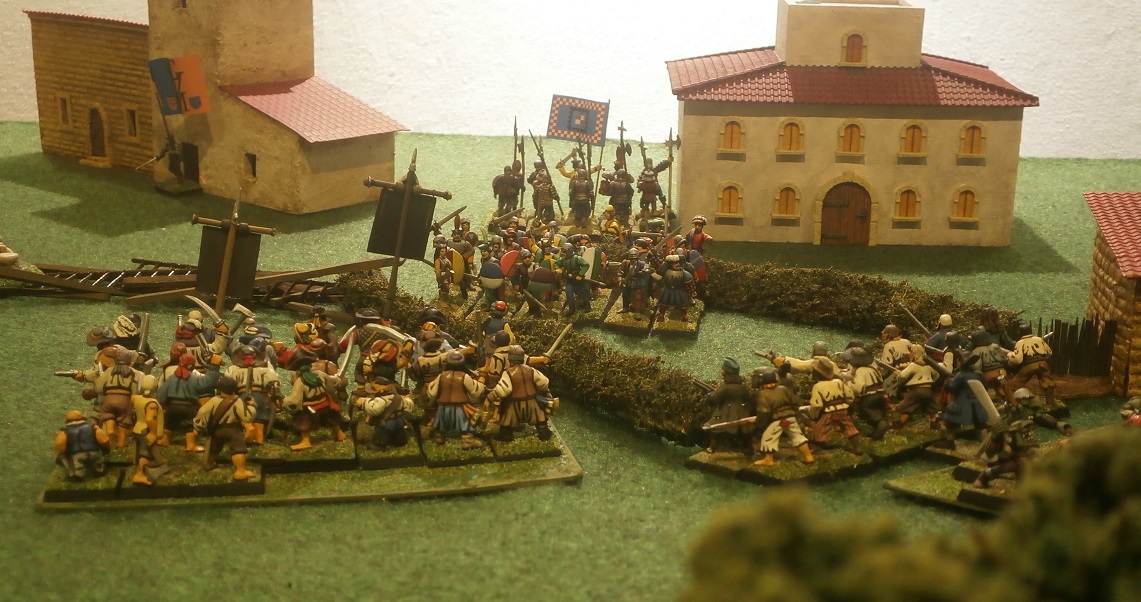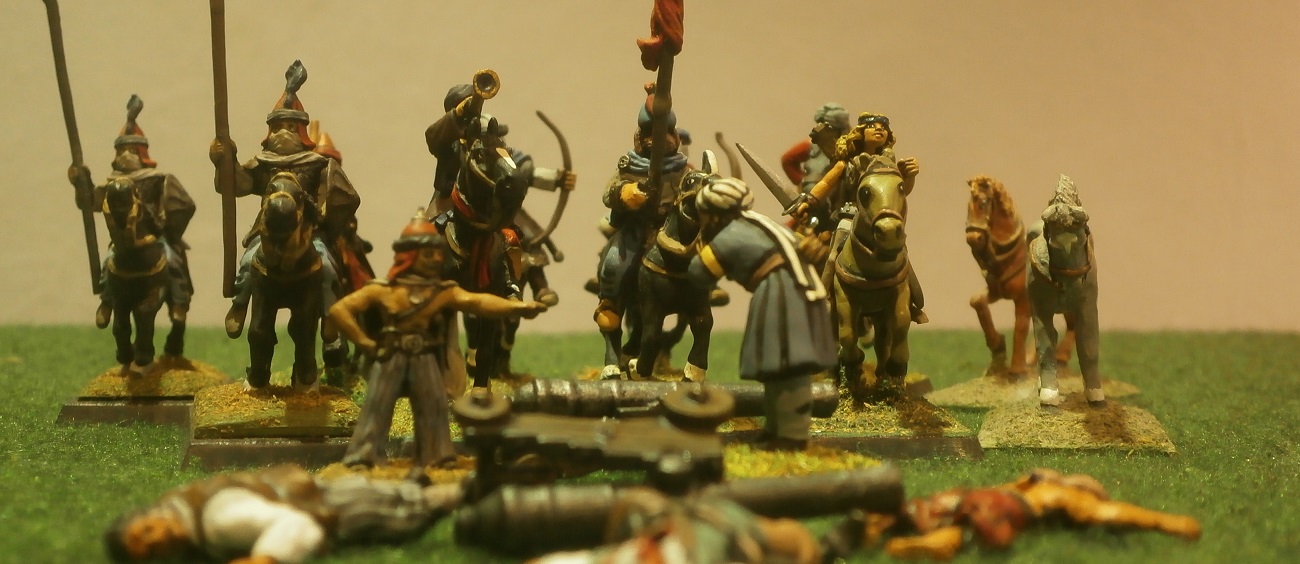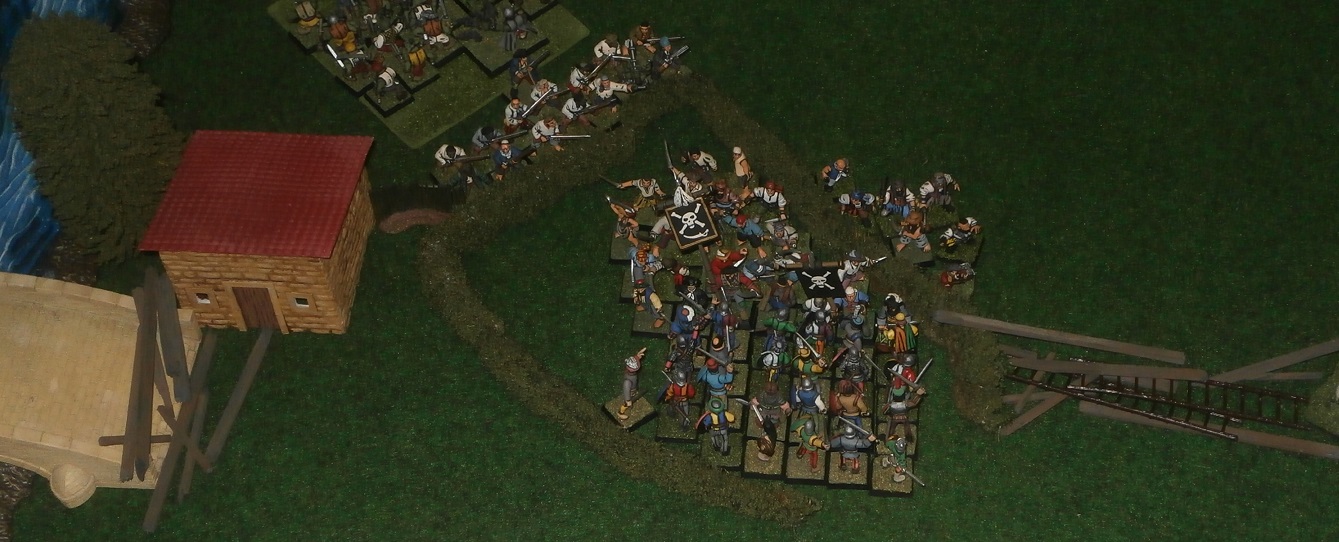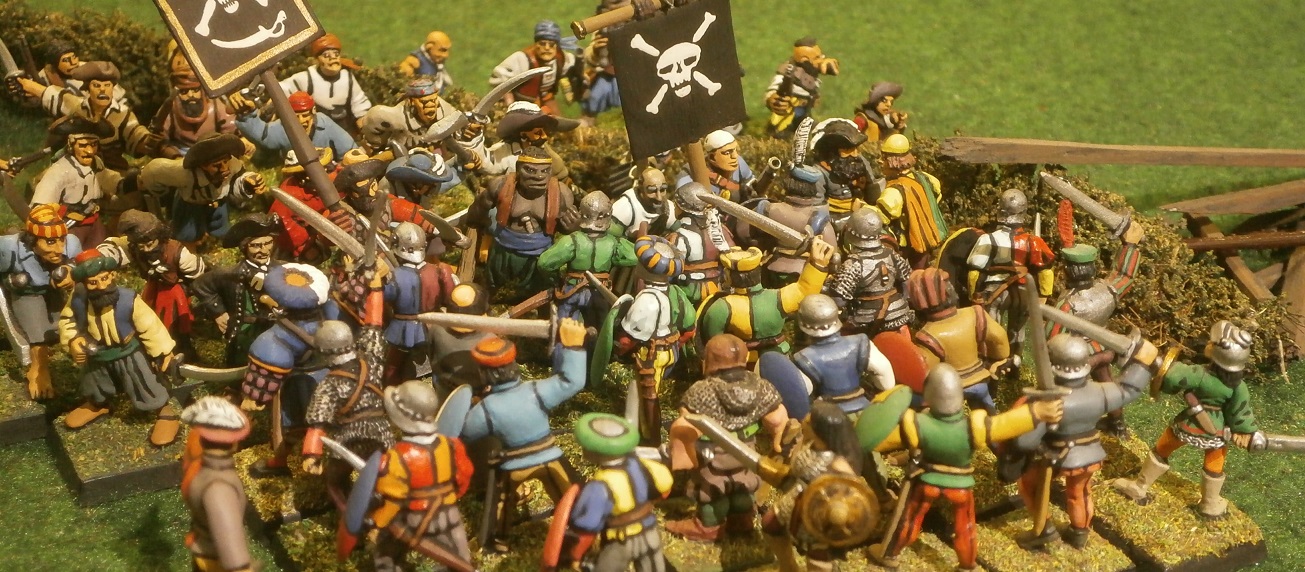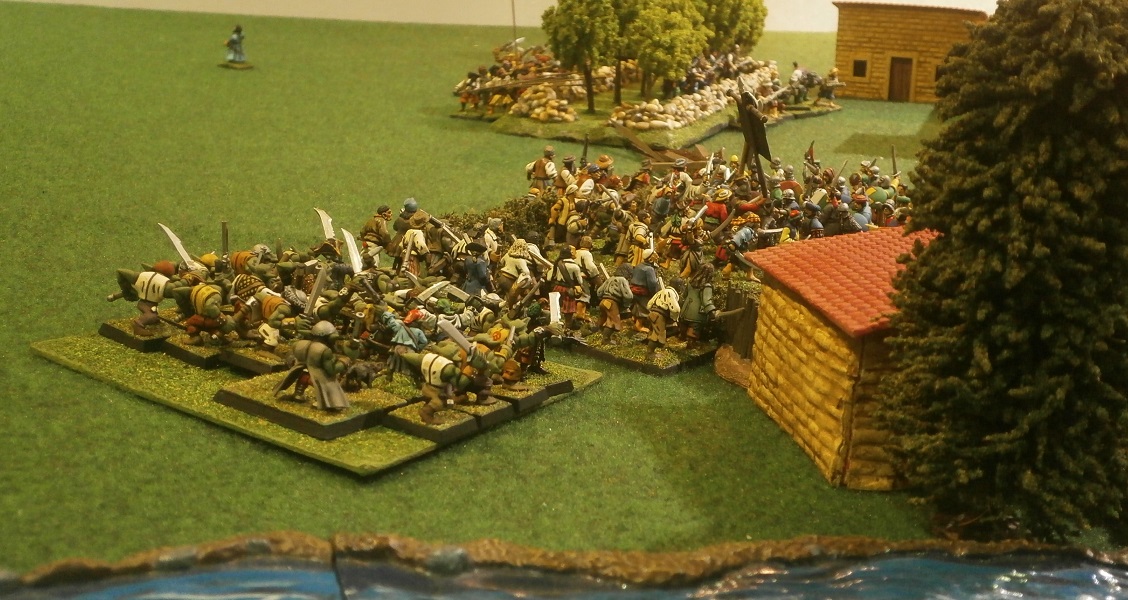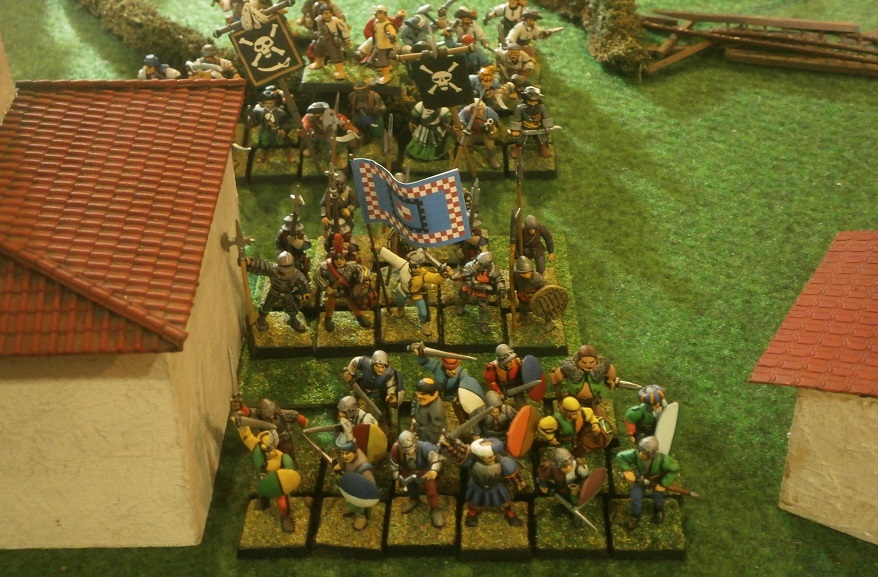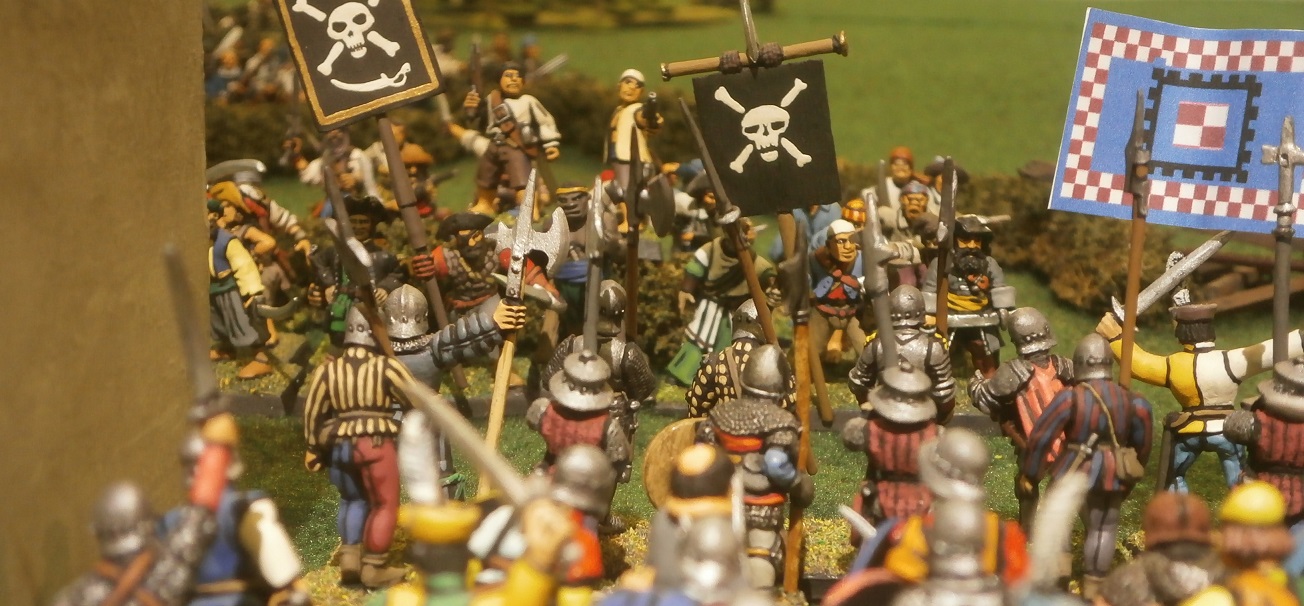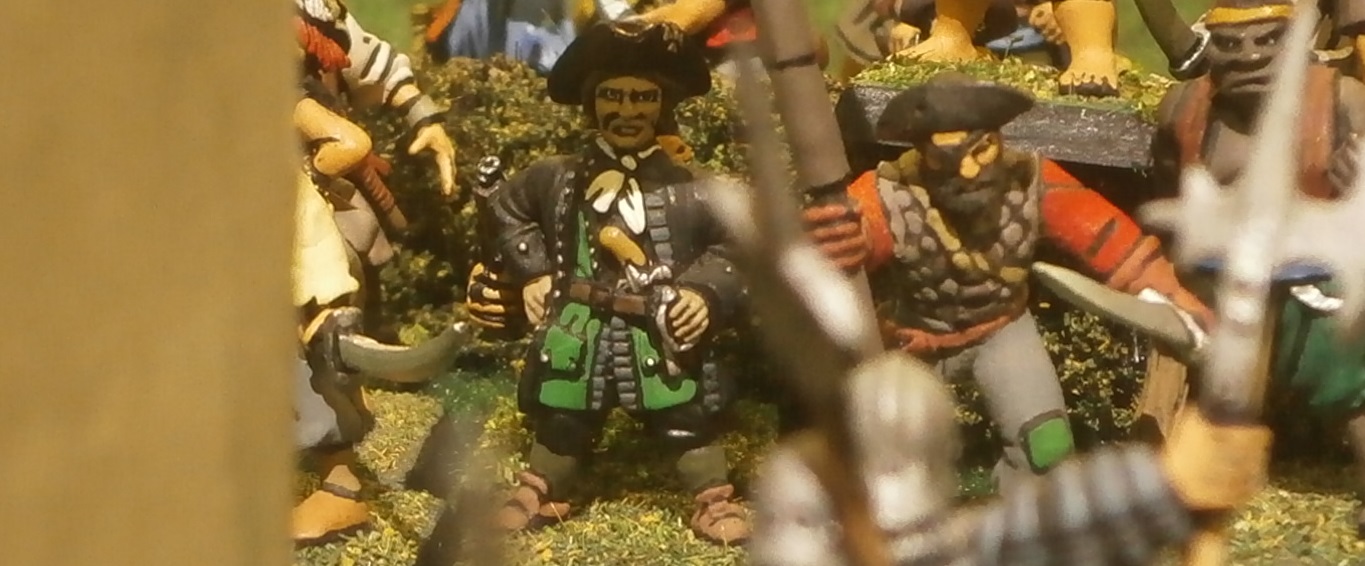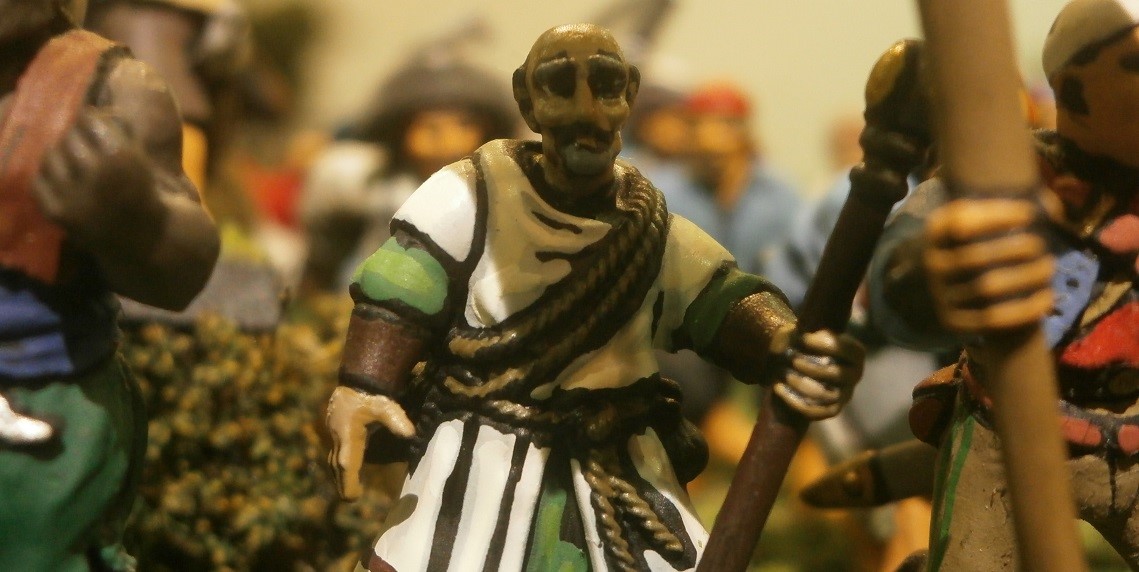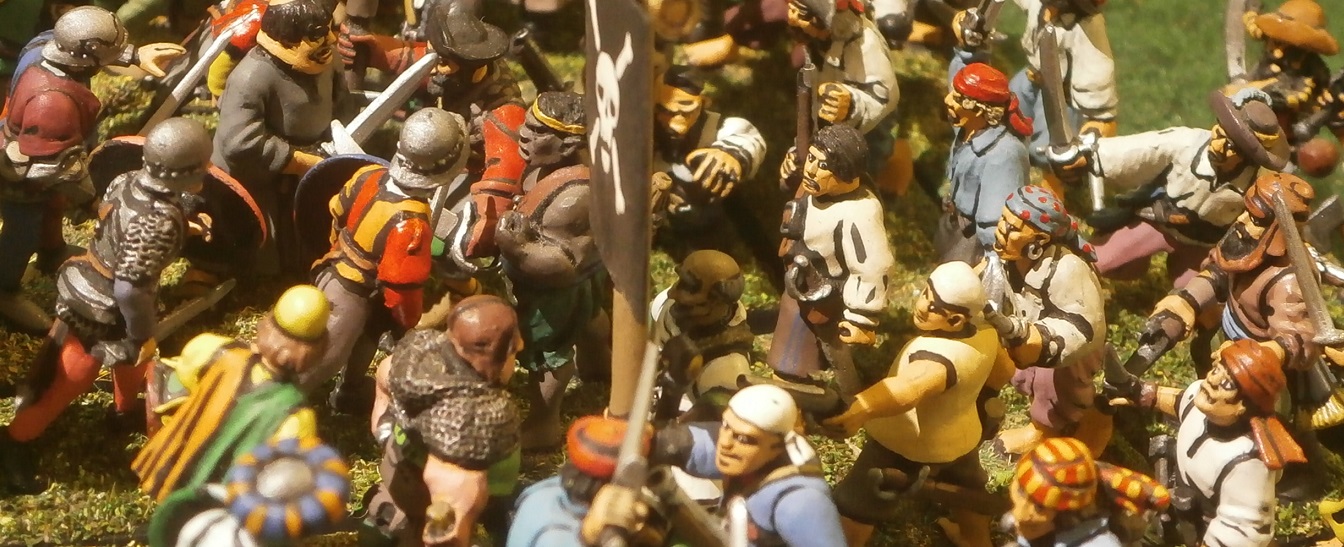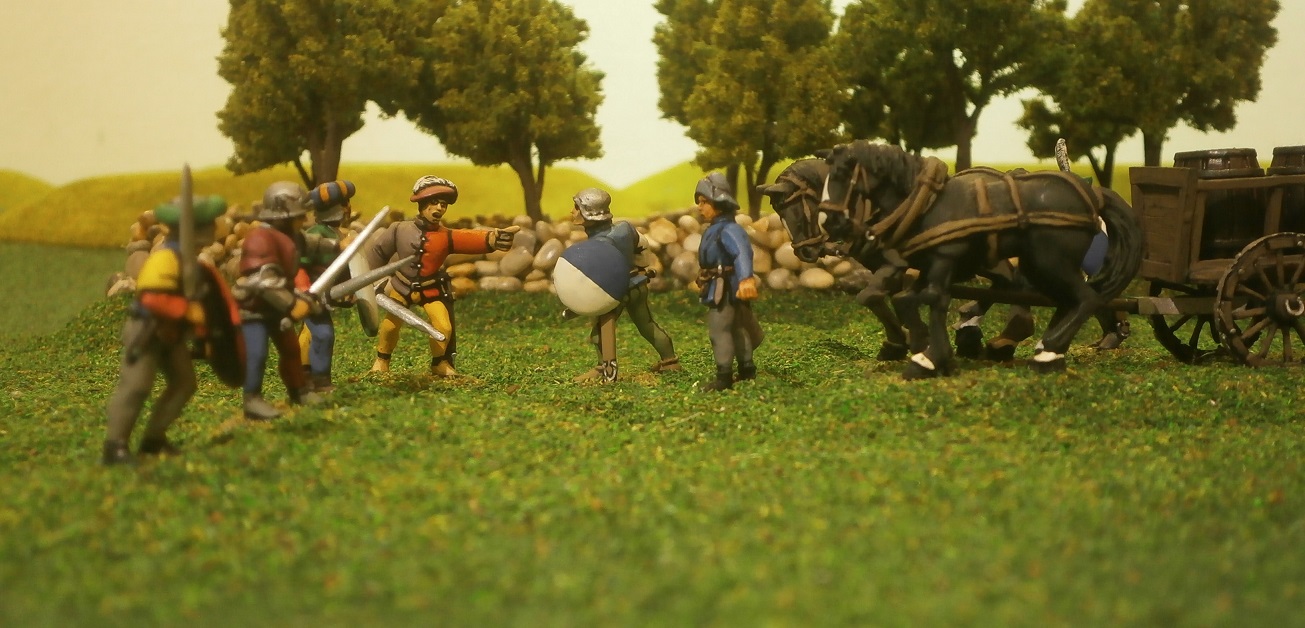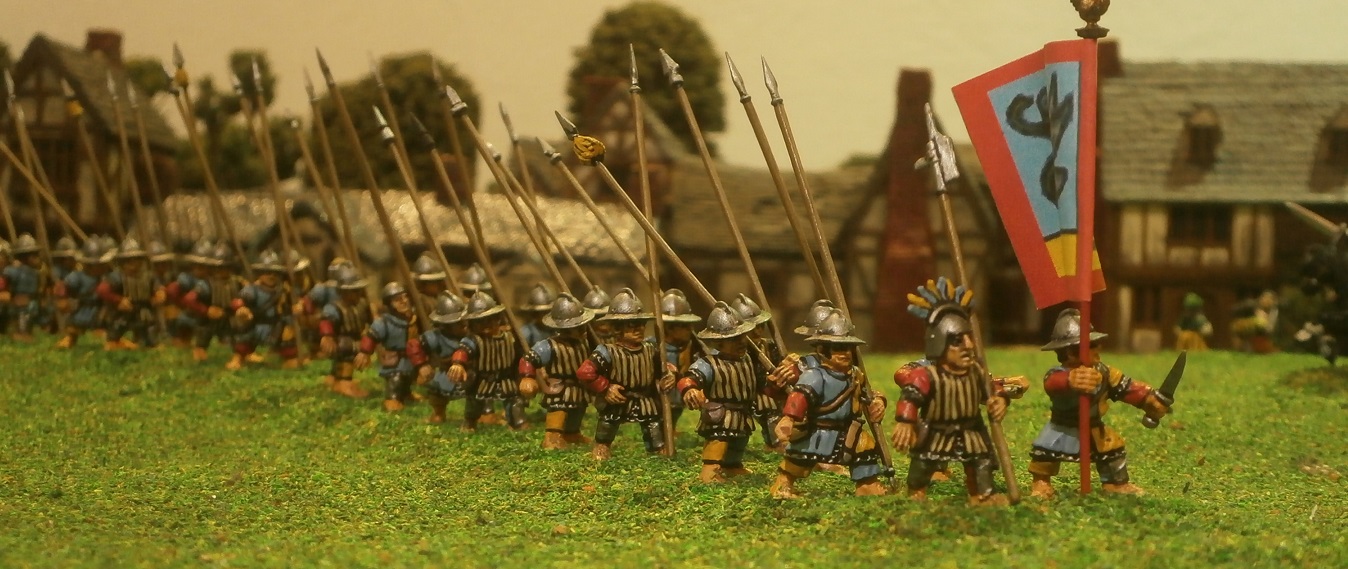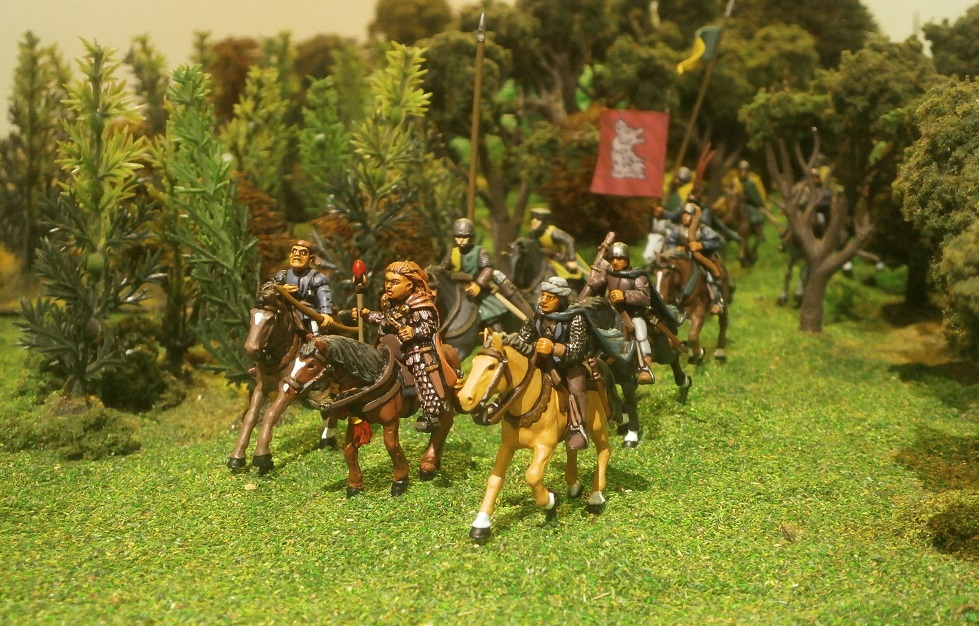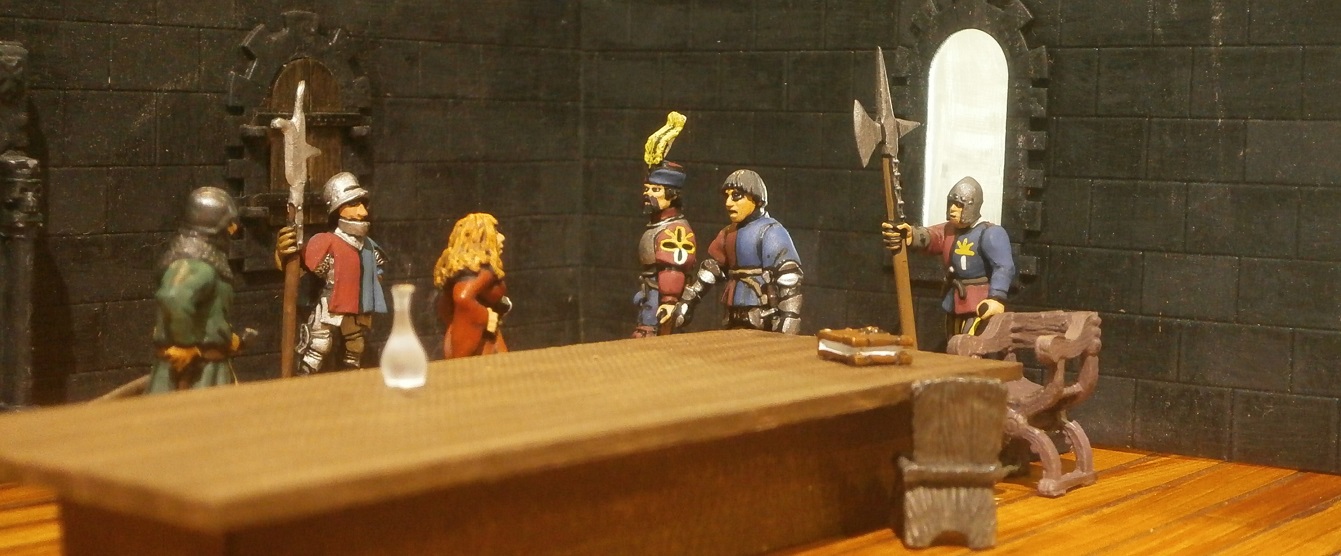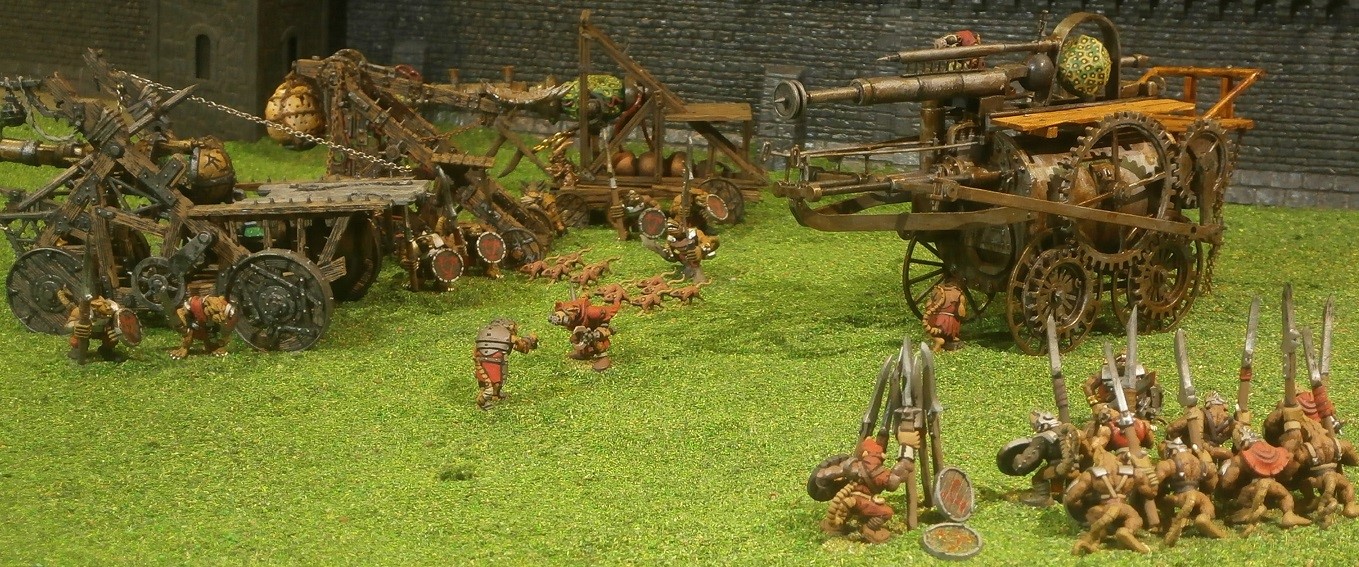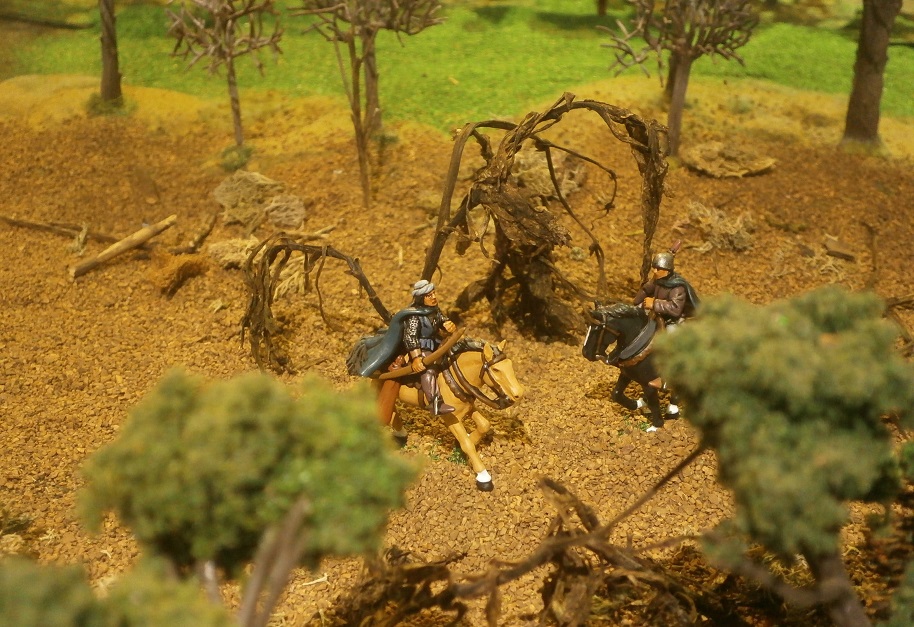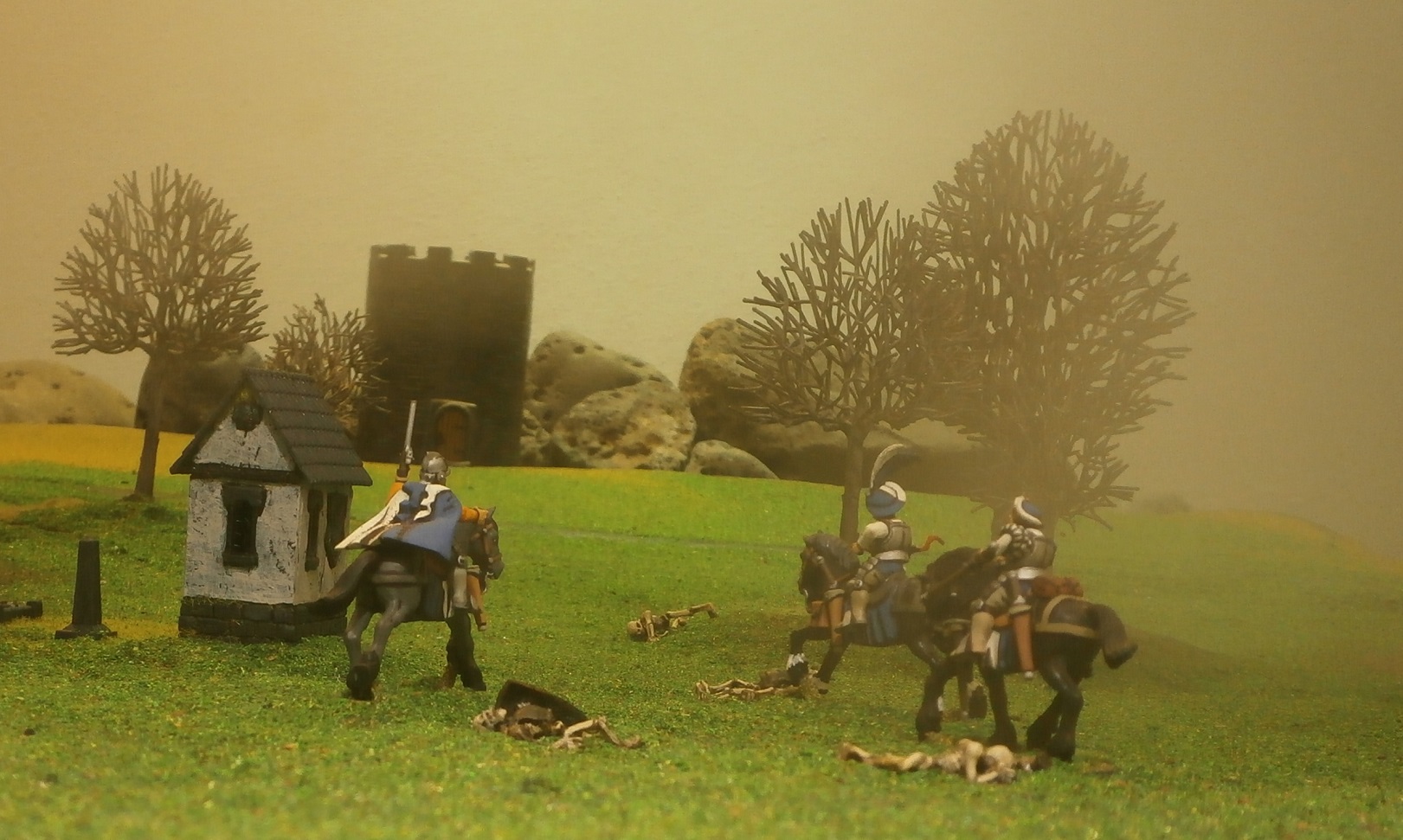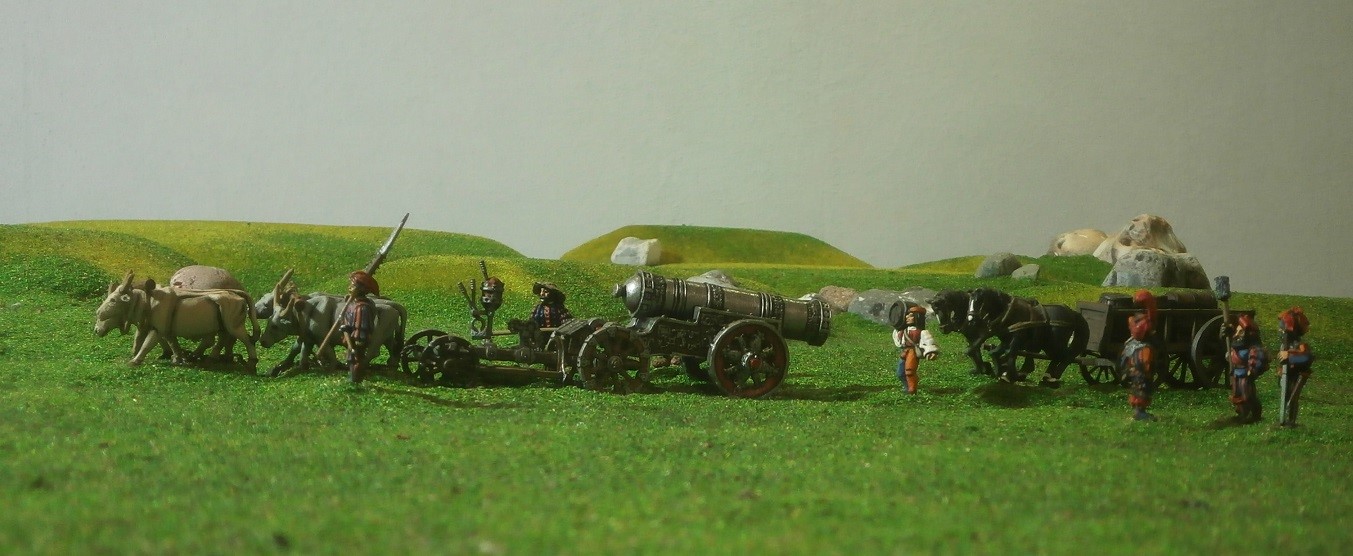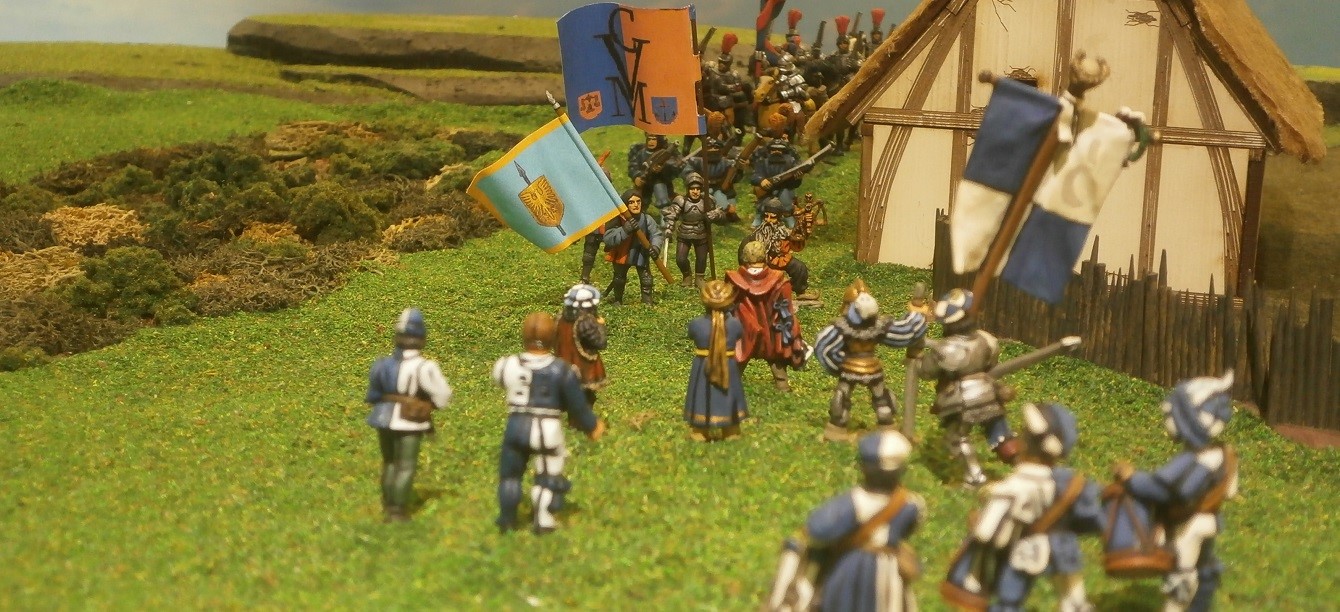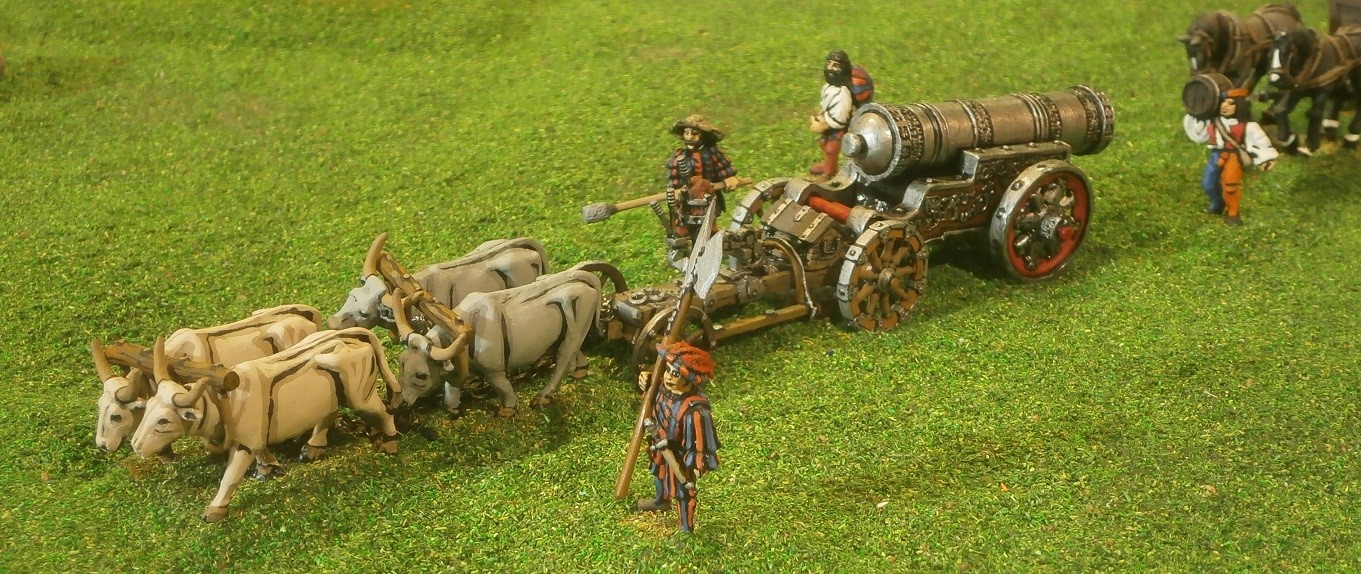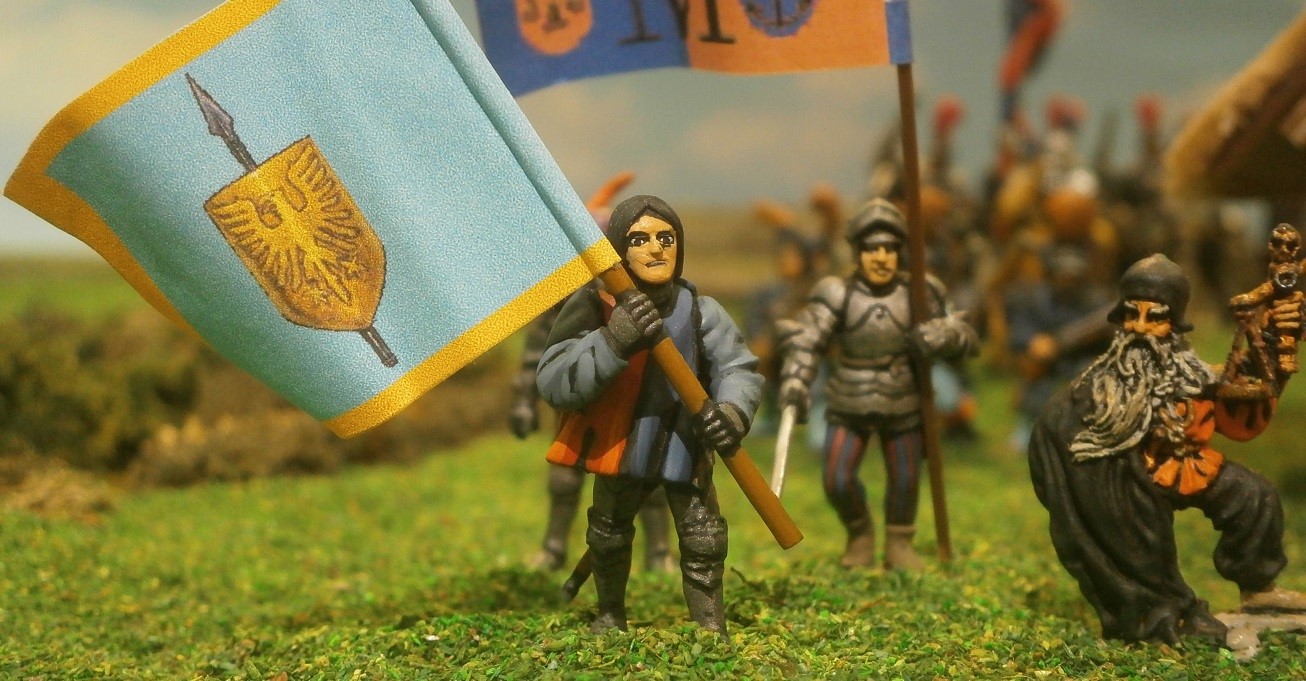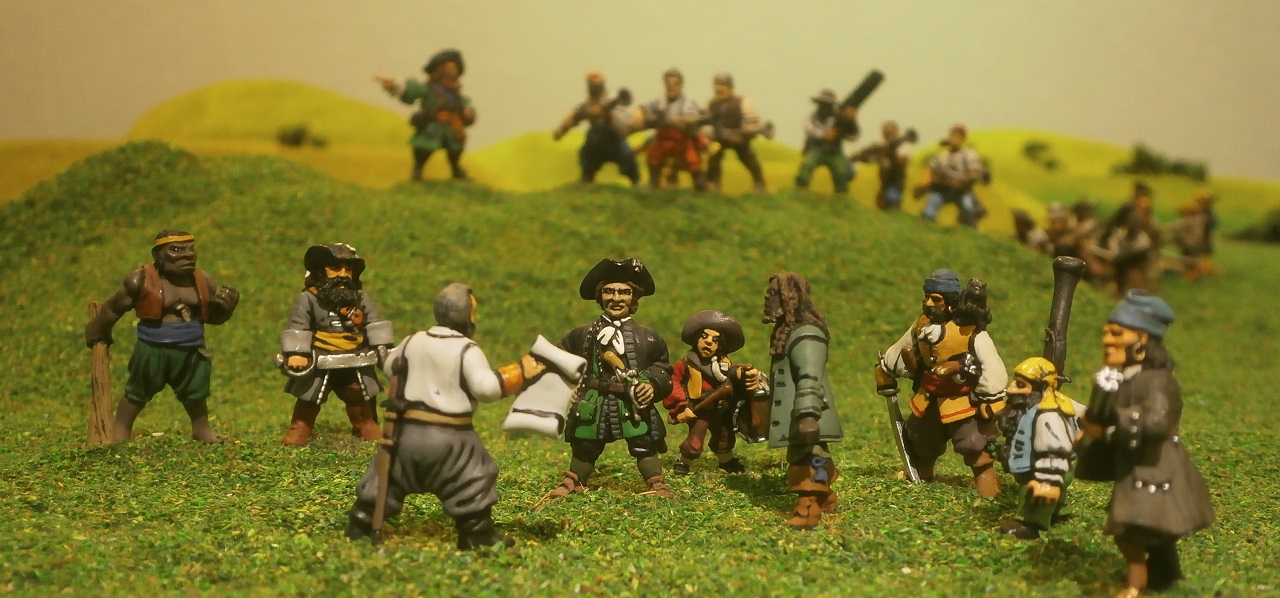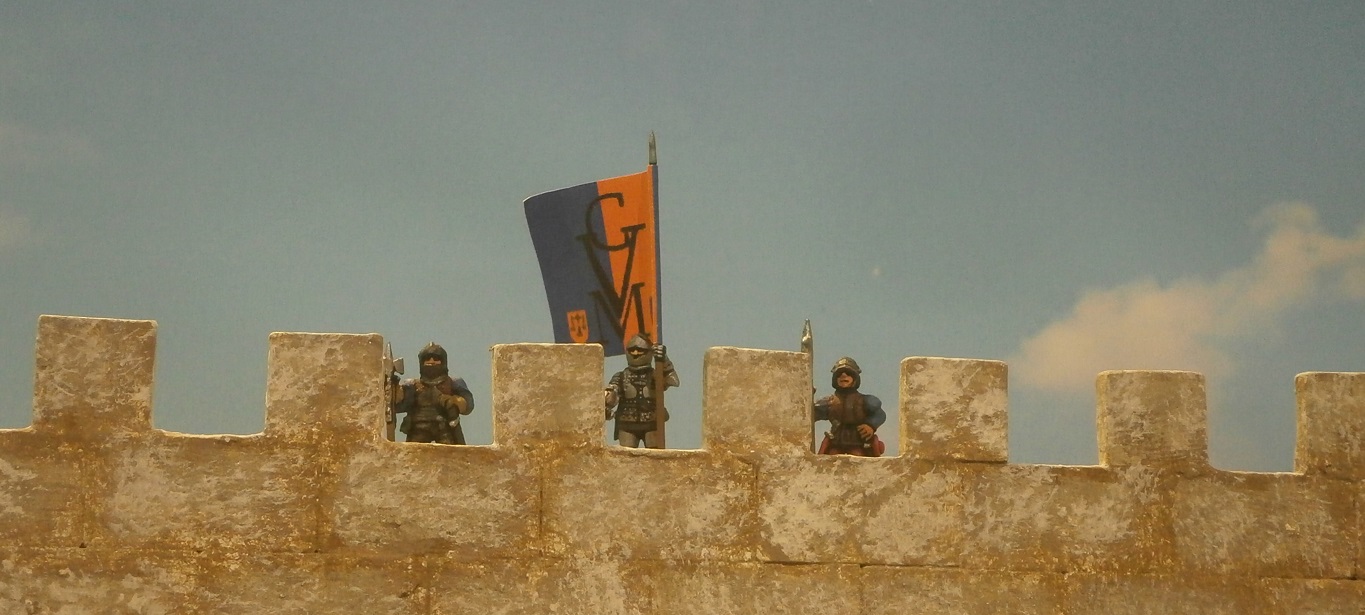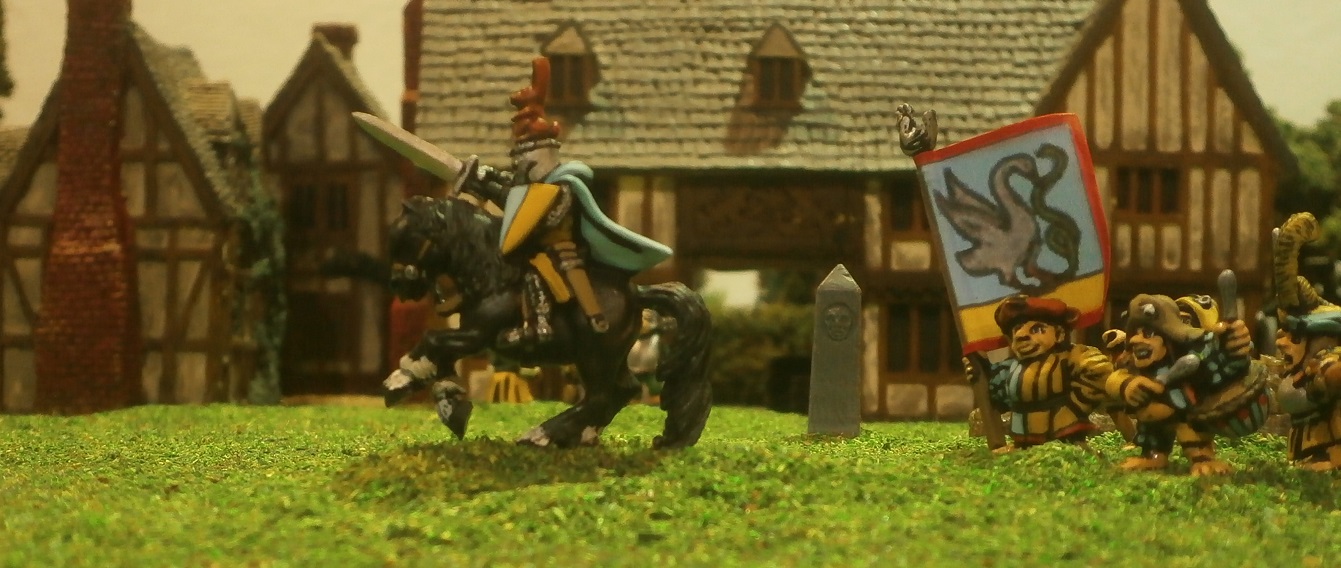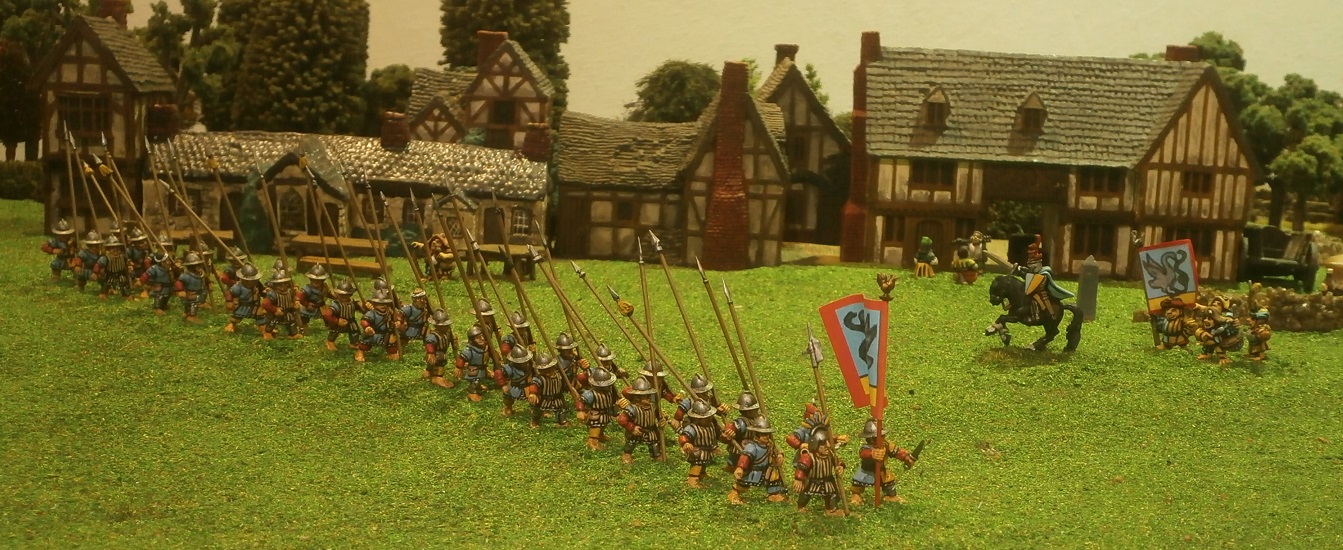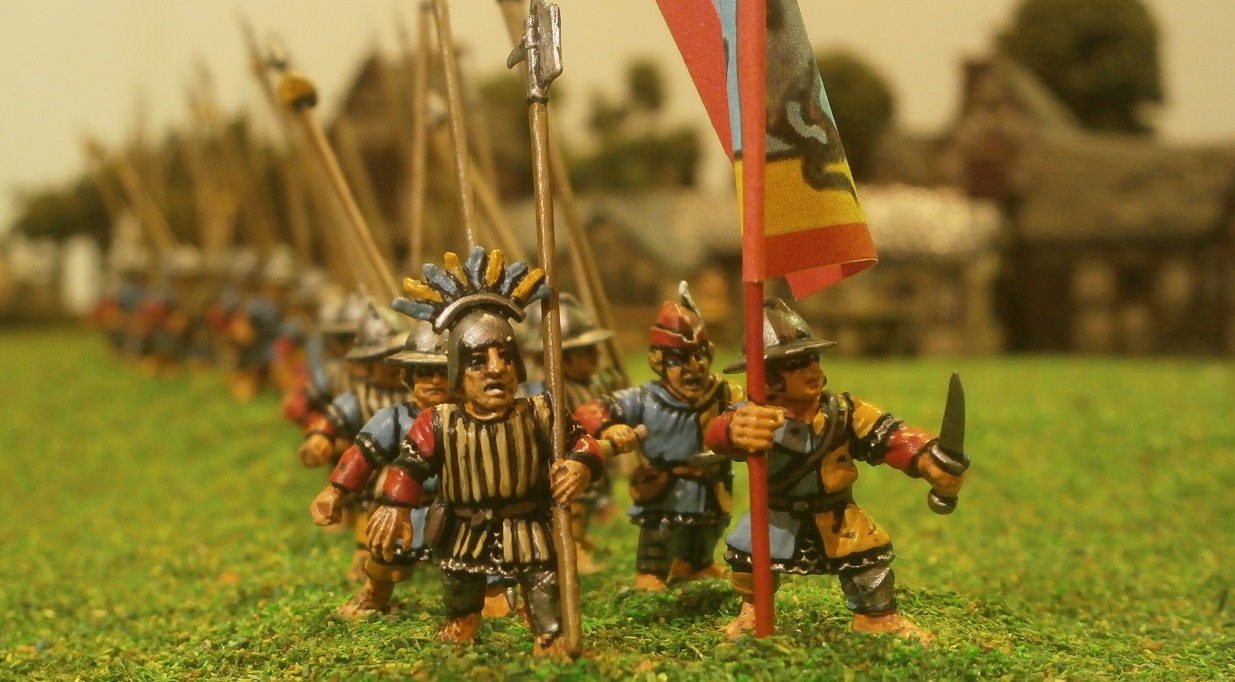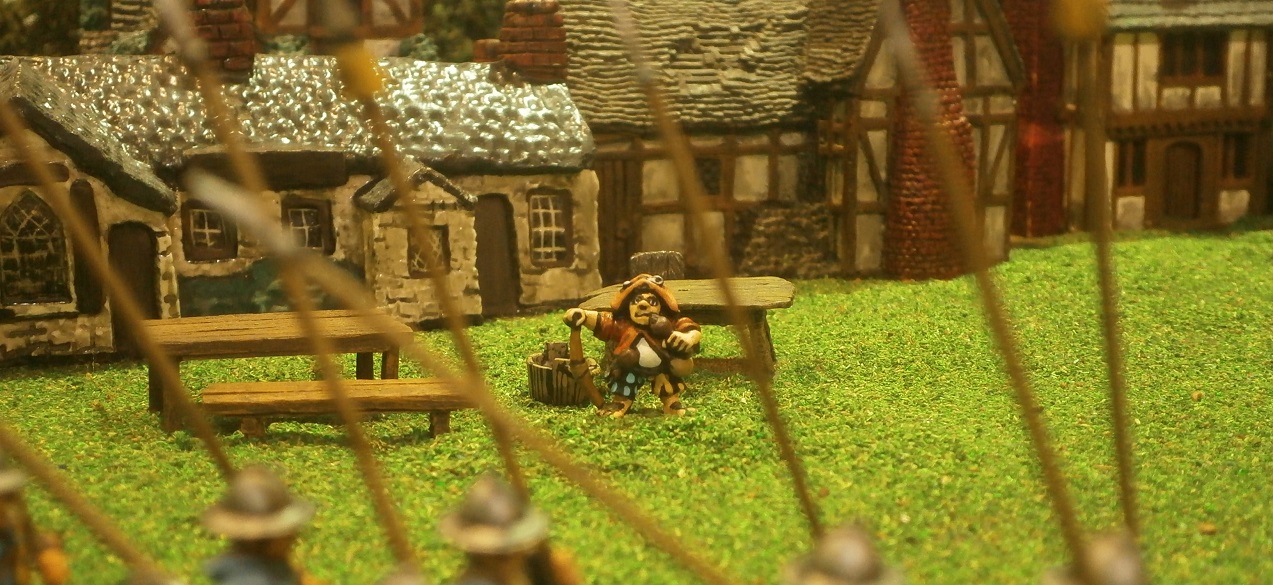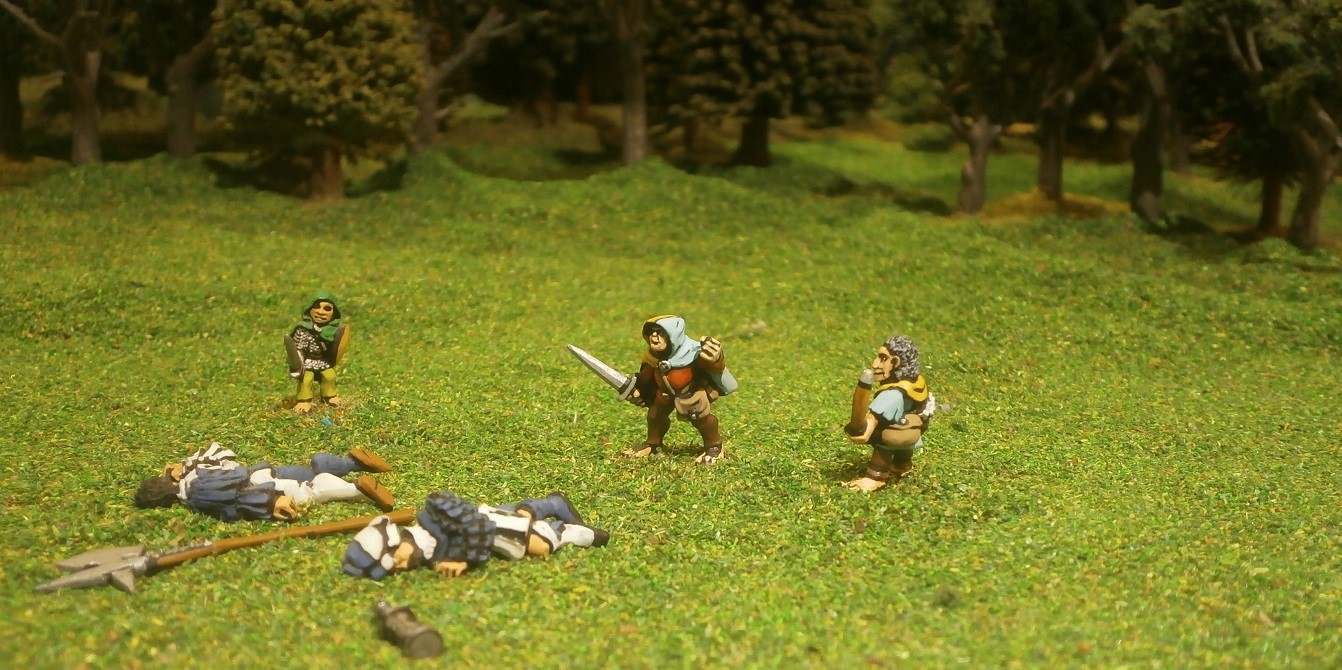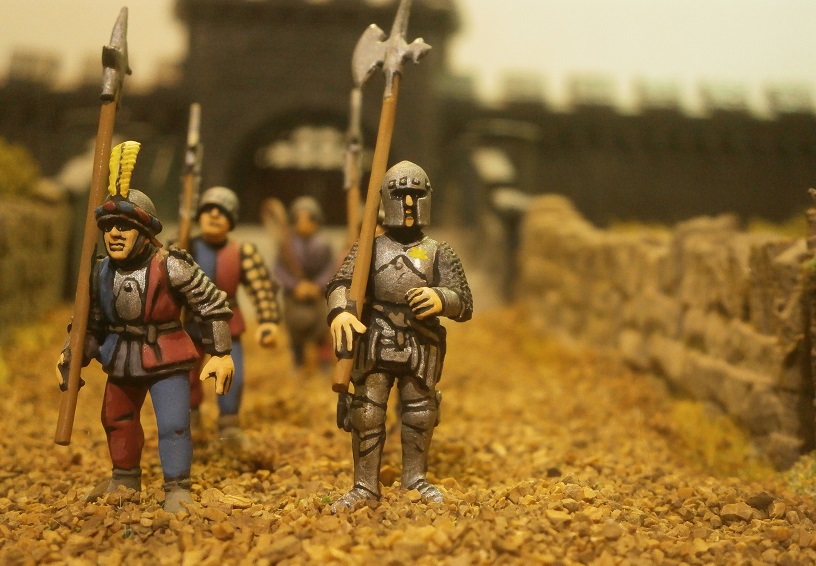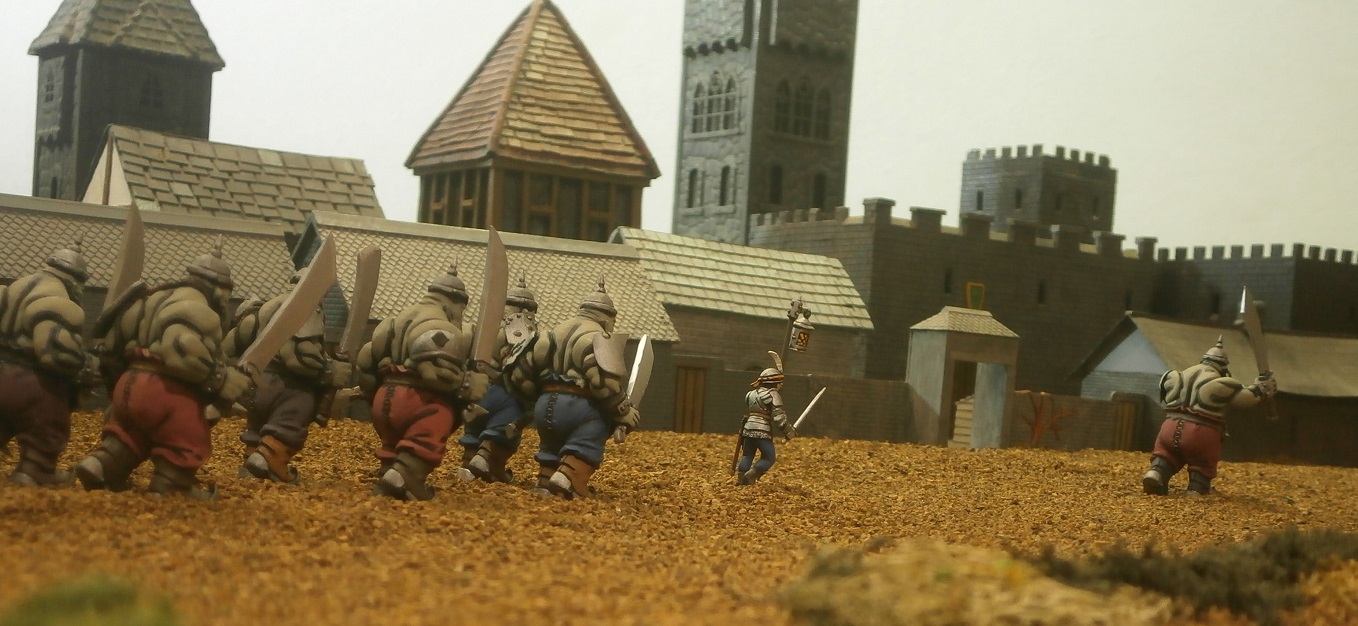Thanks Symphonic. I get muddled very often, and am utterly dependent on my copious notes and scribblngs! Luckily the campaign account acts a an historical record which often helps. The trouble is, what gets into the published story might only be half of what is actually going on!
Here's the first part of the battle report ... (BTW, 2781 pts of Pirates are taking on about 1600 pts of militiamen and mercenaries)
We Know Our Business
The Fight at Sersale, A Battle Report
As the village of Sersale came into view, Admiral Volker could see that this time the Alcentians had chosen to mount a proper defence. There had been squabbles at Mintopua and Mottola, and some of his scallywags had died, but for whatever reason the defenders had not mustered any real strength to oppose them. His captains had become convinced it was because there was no strength to muster, which indeed had been the thinking behind their decision to target this particular realm. Everyone knew the Alcentian marching army, mainly composed the VMC’s foreign mercenaries, had marched to fight the vampires in the north. Even then, they had stopped to argue on the way with the duke of Pavona, so apparently, they were not in a hurry to get to the north.
“Maybe,” Captain Van Baas had joked recently, “they ain’t in a hurry to return either?”
Volker had pondered over this a while, to consider what possible reason the VMC might have for delaying their return. In the end, considering the wealth of this realm, all he could come with is that they were too far away to return quickly. But if the company had been prepared to dispatch their army so far, then it was likely it had left something behind to defend its precious new possession, its milch cow.
Adding weight to his internal argument, here at Sersale there were not just militia men and light horse, but regimented bodies of soldiers, one of which was well armoured. As far as he could ascertain, it still seemed too weak a force to have a hope of thwarting his own army, but there could be some trickery at play, or at least a relief force on its way. Had they decided to defend this place rather than their city walls to buy time? Or were they simply, desperately unwilling to watch any further destruction of their property?
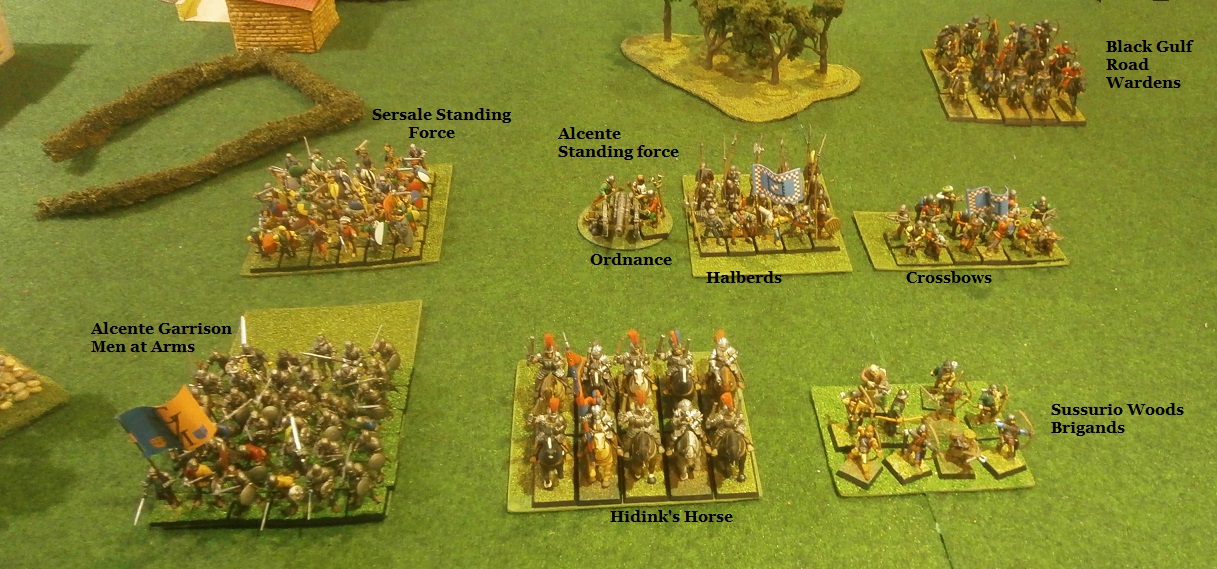
The enemy possessed one piece of ordnance for his three, which meant his own guns would have a little work to do before they could send their shot at the main bodies of soldiers. Two regiments bore Alcente city standards, chequered red and white bands on a field of blue, with black crenelations presumably to represent the city walls. These were probably the city’s drilled militia, endowed with some skill in their halberds and crossbows. A large body of well-armoured soldiers bore the orange and blue colours of the VMC itself, most likely professional mercenary soldiers bought with the ample funds available to such a rich trading company. They could be trouble, as could the pistoliers carrying the same colours.
Then there was a large body of swordsmen, rivalling the men at arms in size, but with no standard. These were possibly the local militia, but that did not mean they could be discounted as a threat. Being so close to the Black Gulf, even the part time soldiers of this region were likely to know their way about a sword. And if this was indeed their home, then what need had they of a standard to inspire them to fight?
The village itself was flanked by a river, crossed by a stout stone bridge. Several large dwellings were surrounded by small, enclosed fields and orchards, making the place fairly defensible, even without any further work.
No bad thing, then, thought Volker, that this time had brought his entire strength to bear. Previously, at Mottola, he had dispatched Captain Van Baas and his crew to take and raze the village, while he and the rest of his army waited close by to lend support if required, but most importantly to counter-attack any relief force dispatched from the city. This last is exactly what had happened, and several many VMC horsemen had perished in their pathetic and abortive attempt to relieve the village.
He and his three surviving captains had brought their crews. Both his crew and Van Baas’s had been badly mauled in previous fights, so, as he approached the village, he had commanded them to amalgamate into one body, all the better to apply strength of numbers in any fight they took on. Van Baas did not complain, and indeed seemed relieved. Maybe his crew had been grumbling about their losses, becoming a tad mutinous, and this strengthening had reassured them?
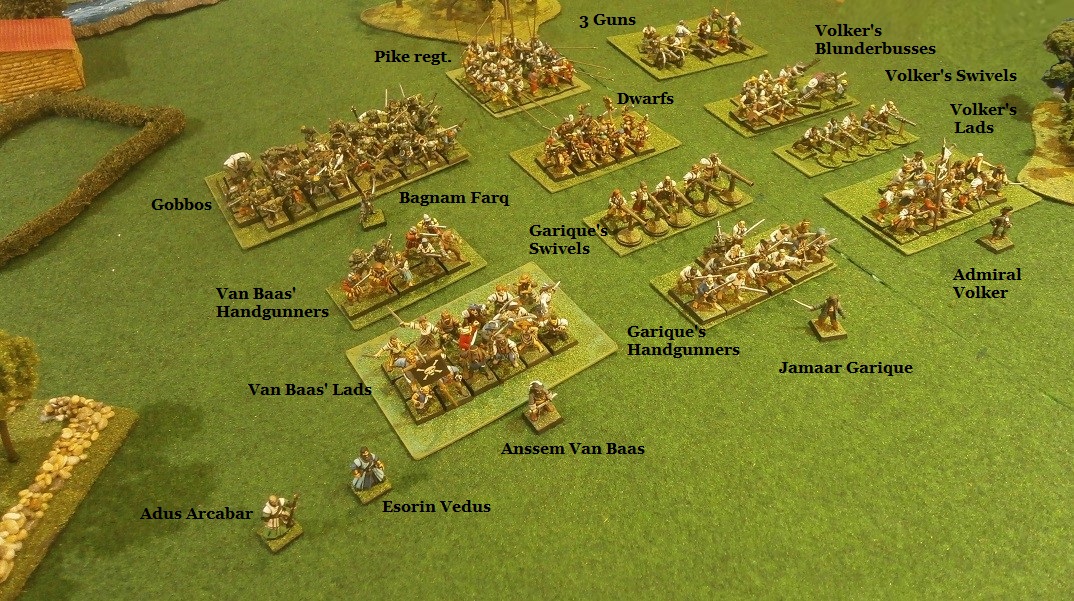
Volker’s Sartosan army was heavily reliant on black powder, for as well as the three pieces of ordnance, he had two companies of handgunners, another of blunderbusses and two armed with swivels. The goblin Captain Farq’s lads also favoured powder, being verily festooned with pistols, but unlike the dwarfs (bereft of their captain, Brewaxe, since the battle near Luccini), their pieces were somewhat ill-kept and unreliable. Such was the way of goblins. Volker often wished it was not also the way of several of his own crewmen, but it was not the place of a pirate captain to apply the lash, rather to persuade with promises of wealth gained, and inspire by example. Although keeping their weapons free of rust, well-oiled and ready for battle was stipulated in the seventh clause of his own ship’s articles, there had been some pettifogging debate of late whether said articles applied on land.
His recently raised, but already reduced in strength, pike regiment was intended to add a better defence against enemy horse soldiers, and his two wizards, Arcabar and Vedus, were there not just to dish out magical harm but to counter whatever spells the enemy could muster. Right now, however, it looked like the only horse the enemy possessed was on the wrong side of the river, and Arcabar had commented that he could not sense the presence of any wizards at all in the village. Still, thought Volker, better to be safe than sorry. More horse could come, and any wizards might be hiding right now, biding their time before they struck.
The defenders had deployed mostly within the confines of the village boundary, except for the pistoliers upon the far side of the river. Volker had sent no-one that way, having failed to find a bridge to cross, but was not concerned, for he reckoned his lads would make short work of them, the river notwithstanding. The young horsemen would surely learn the folly of prancing about within range of his pieces!
A few archers were lurking among the trees of the stone-walled orchard, like brigands awaiting the passage of prey to rob, while the city-militia crossbows manned a hastily made barricade of ladders and planks between the orchard and the hedged field.
The enemy’s largest regiments waited behind, on the village’s street, obviously hoping to thwart his Sartosans’ advantage in numbers by fighting within a restricted space. What use was an hundred men if only those six at the front could bring their weapons to bear? Volker knew from ship to ship fighting that with such restricted access even ten men could hold back a hundred, if bold (or desperate) enough.
The enemy’s single gun was out on their far-right flank, concealed behind a hedge, and well sited so that it could aim its muzzle at almost any part of Volker’s army. It was heavier than his own pieces, but this was a fight for field pieces, not great guns, and so he was not too concerned.
Volker intended to bring the full strength of his own army to bear and in so doing present such a sight as to strike fear into the outnumbered enemy, which is why he commanded his army array in one long line of battle. Such a deployment would also help his guns big and small to play at the foe unhindered. So it was that he put his ordnance, swivels and handguns, on either flank, while his three largest bodies, being the pike, Farq’s goblins and his and Van Baas’s conjoined crews occupied the centre.
His dwarfs he put out to his left, to ensure that flank – and the baggage - was protected by something that could fight hand to hand, and hard. Out on his right, the river, in full flow due to the season, meant he did not need to worry so much. Only the foolish, or the desperate, would attempt to cross it. And they would fail.
Nevertheless, his right flank would present quite a challenge if the pistoleers thought they could harry his troops from the far side of the river, what with a body of swivel gunners ensconced in the trees and two companies of handgunners flanking them. It would be interesting to see how pistols fared against their larger cousins!
As well as the dwarfs on the left, he had placed two of his artillery pieces and his own blunderbuss-armed crewmen, including Draja the great orc and his mighty firearm ‘Mine’. Volker had seen what Mine could do - it was colourful if not exactly pretty.
Behind them was the baggage, and although the wagons, carts and mules carried much of the loot so far stolen (a considerable fortune) Volker was not too worried about the enemy attempting its capture, for they would surely be far too busy defending what they already had to bother with trying to take more. Still, it comforted him to know that the dwarfs were close by to keep an eye on it.
He himself personally commanded the joint regiment of his own and van Baas’s mariners. His yellow shirted navigator, Ubaida el-Noor stood to one side of him, and on the other was his standard bearer, carrying his colours of a death’s head above a cutlass.
Next stood Van Baas’ bosun, Moukib Brahimi, then the wizard Adus Arcabar, and on the far-left Van Baas and his own standard bearer. Crab, the young lad who carried the drum, had been relegated to the second rank for want of space amongst the officers and artists at the fore. Vedus, the other wizard, was marching with the pikes, whilst Captain Jamaar Garique was commanding his handgunners on the right. Volker was glad that Jamaar was out there to keep an eye on things – the fellow had proved himself competent many times over, a safe pair of hands.
Volker’s booming voice, a startling sound to issue from so slight a man, signalled the advance, and the Sartosans began to close upon the village, keeping in step for now, with the dwarfs, thus maintaining a straight line and ensuring plenty of unobscured targets for the artillery big and small!
The three central regiments fair bristled with steel, either sword blades, pistol barrels and pike heads, and made a sight to see as they moved as one. Volker was under no illusion and knew full well that Captain Farq’s horde of goblins on his right were pretty much all show and little substance, but to the enemy they would look frightening enough.
Quieter, so that only the men near him could hear, Volker said, “That’s good lads! Steady and neat. Let’s show ‘em we know our business.”
He wondered what it must be like to be in the village looking out, to see an entire army of renowned robbers closing in, an enemy that had already devoured the western reaches of the realm and was clearly intent on continuing its feast. Would the sight sow fear or resolve?
No matter, he thought. We’ll find out soon enough how they feel about fighting today.
He could hear Farq’s shrill shouting as he too ordered his mob onwards. The goblin captain had spent the previous night bragging how he and his lads would surely get to grips with the enemy before anyone else, leaving little work for the rest of the army, then trying to convince the other captains to offer him and his lads a reward in advance, which he said was only appropriate as some of his lads would be dead afterwards and so would not enjoy their rightful reward if not given immediately.
Volker had probably spent too long trying to work out if the goblin was joking, until he remembered that goblin humour invariably involved inflicting suffering on some poor unfortunate, even one of their own. If it was a joke, then he would have to keep an eye on Farq. Goblins were renowned for having more cunning than orcs, but too much cunning could make Farq dangerous to any who believed him to be their friend or follower.
Of more immediate concern to Volker was his chief wizard, Arcabar, for the man was on the wrong side of old for a battle, toothless and wizened, despite his obvious ability to weave formidable conjurations.
The previous night Arcabar had reassured him that if he was strong enough survive the flip they were drinking, a heady mixture of rum, beer and sugar, heated up with a red-hot poker, then he was strong enough for battle. When asked if he lived that morning, Arcabar had belched before opening his eyes, then asked, “Can the dead do that?” Now, as they advanced, Arcabar proved he was indeed strong enough to hurt the foe, for he conjured up a magical shower of lightning bolts to hurl towards the crossbowmen at the enemy’s front and centre, cowering behind their makeshift barricade.
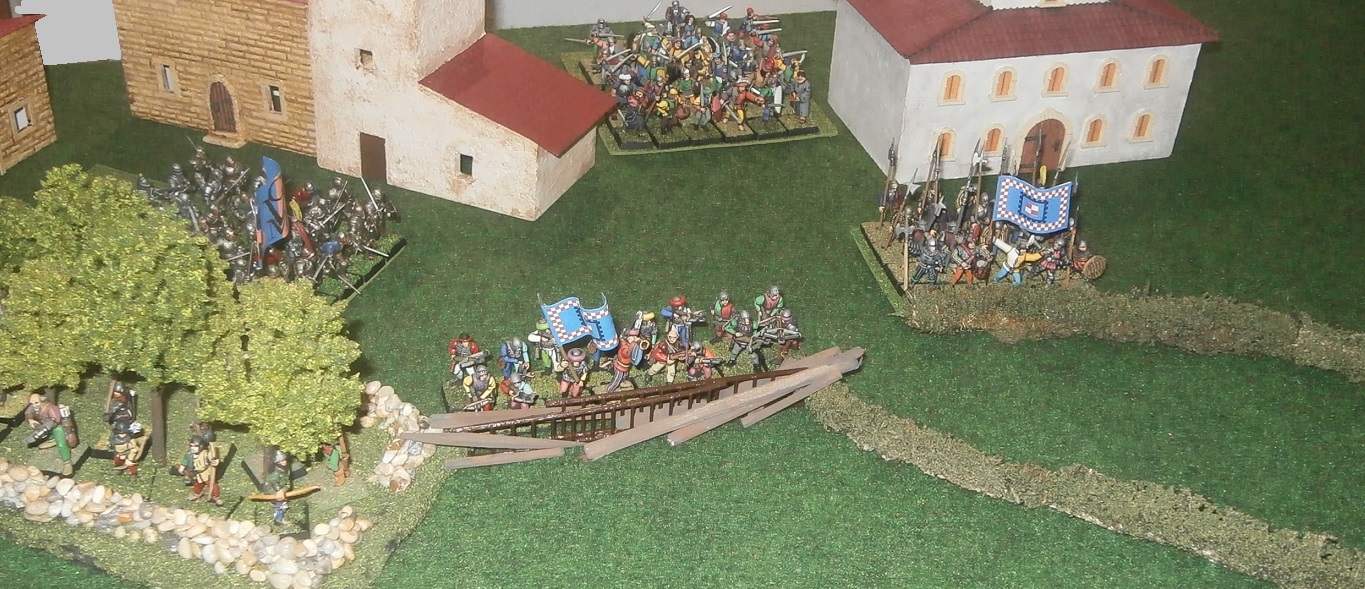
Three of the crossbowmen fell, one screaming horribly, the other two deathly silent as their blackened bodies crumpled. Volker could also see several balls of fire arcing towards the archers concealed in the orchard, undoubtedly invoked by Vedus, but unlike Arcabar’s blue bolts, they dissipated before they reached the enemy. Arcabar himself did not seem to notice his fellow wizard’s failure, busy as he was with killing two more of the crossbowmen with yet another spell, this time causing a sheet of fire to burst from the very ground they stood upon.
Just as Volker wondered what the guns were up to …
… he heard the rippling sound of shots, loud and louder, from all along the line. Impressive, he thought, as the gun on his right sent chain-shot into the already mauled crossbowmen, killing three more. The militia, half their number already charred or torn to pieces, with hardly a moment having passed since the Sartosans began their advance, could take no more and fled from the barrier.
“Fare thee well,” said some wit from the ranks behind.
A moment later there came another boom, this time louder, followed by the sound of shouting from his own lines. One of the brace of pieces to his left had blown up! Volker didn’t know it, but the other had failed to fire altogether. Its crew were not bitter - not after what they had just witnessed. They were just thankful to be alive!
As the enemy’s mounted pistoliers had cantered forwards one of the swivels found its mark and tore one of them from his saddle. The rest, however, closed in on the handgunners on the far flank.
The volley of pistol fire proved surprisingly accurate as they killed five of the nine pirates. Luckily for the rest of the Sartosans, their success was not equalled by the Alcentian ordnance on the other far flank. The gunners lined their muzzle up on the surviving Sartosan gun facing them …
… but their shot merely clipped the piece as it passed harmlessly through the shaken crew.
Father Vettorio, the Morrite priest serving Sersale and several surrounding villages, seeing militia Sergeant Ivo bravely rallying his battered crossbowmen despite their recent mauling, thought to help them with a blessing of protection, but found his prayer thwarted by the enemy wizards.
It seemed his prayers were not going to be strong enough, not with such powerful magic users in opposition. Despite the doubt he suddenly felt concerning the defence of his parish, Vettorio’s courage was not diminished. Neither he nor the Sersalian militia swordsmen he led intended to depart the village.
Live or die, they would stay here either way.
(Turn 1 completed)

